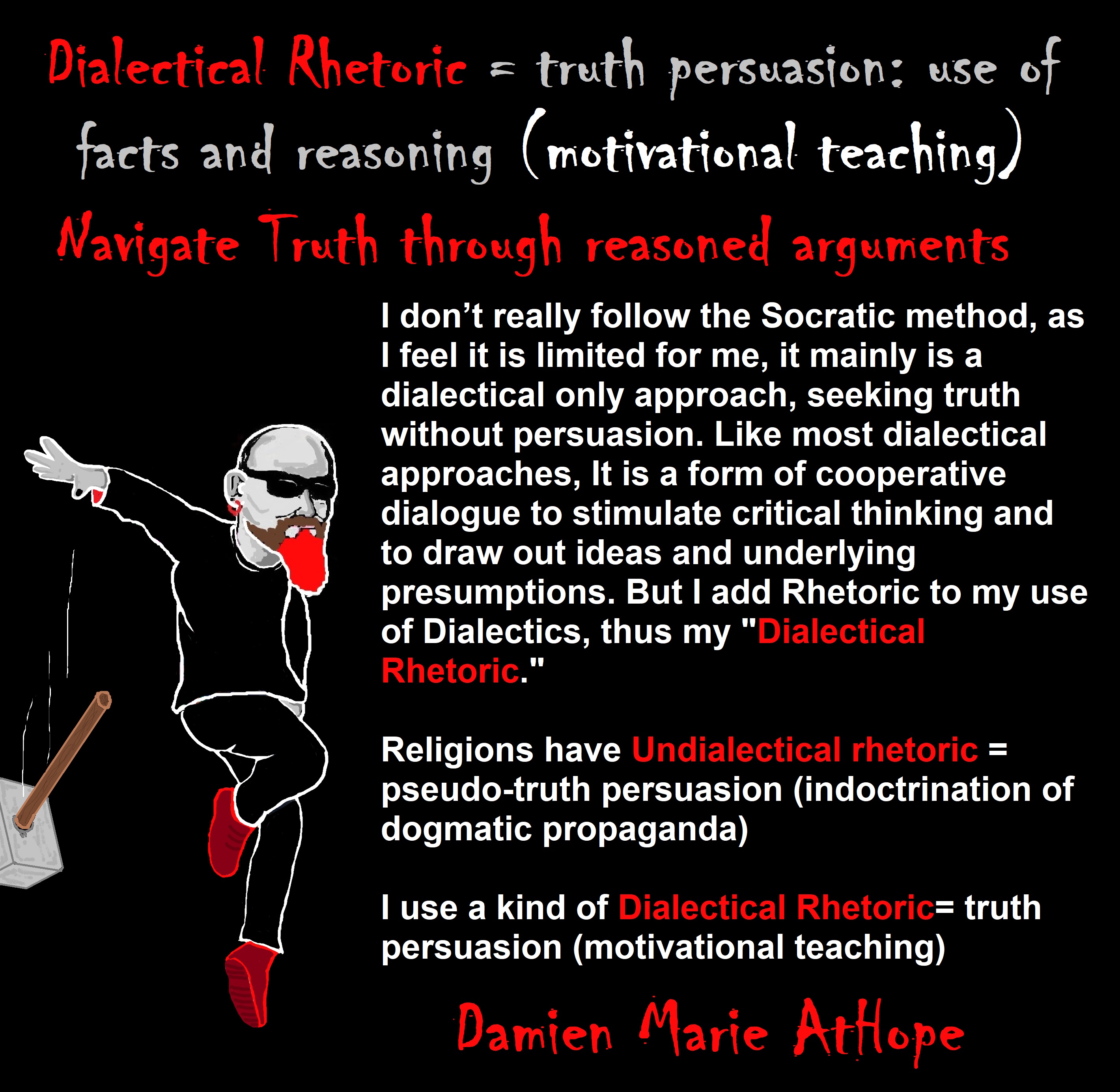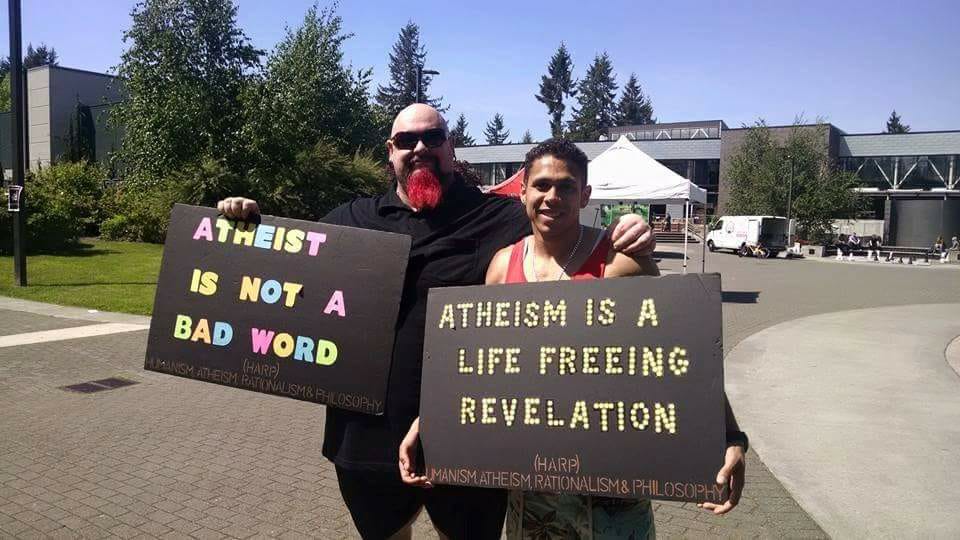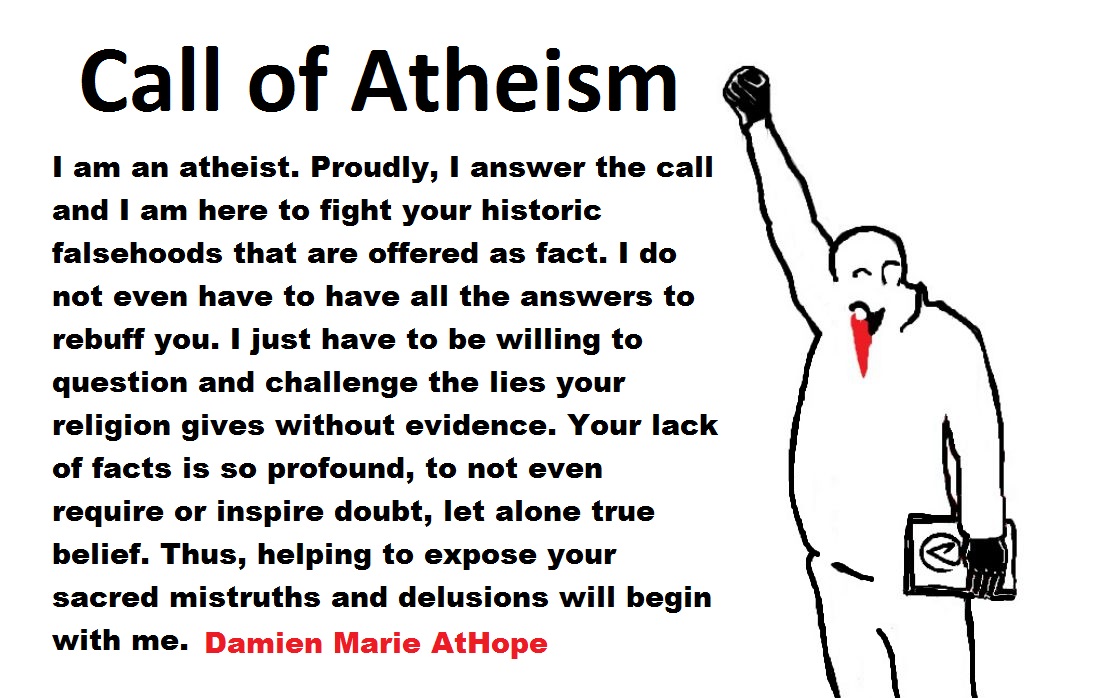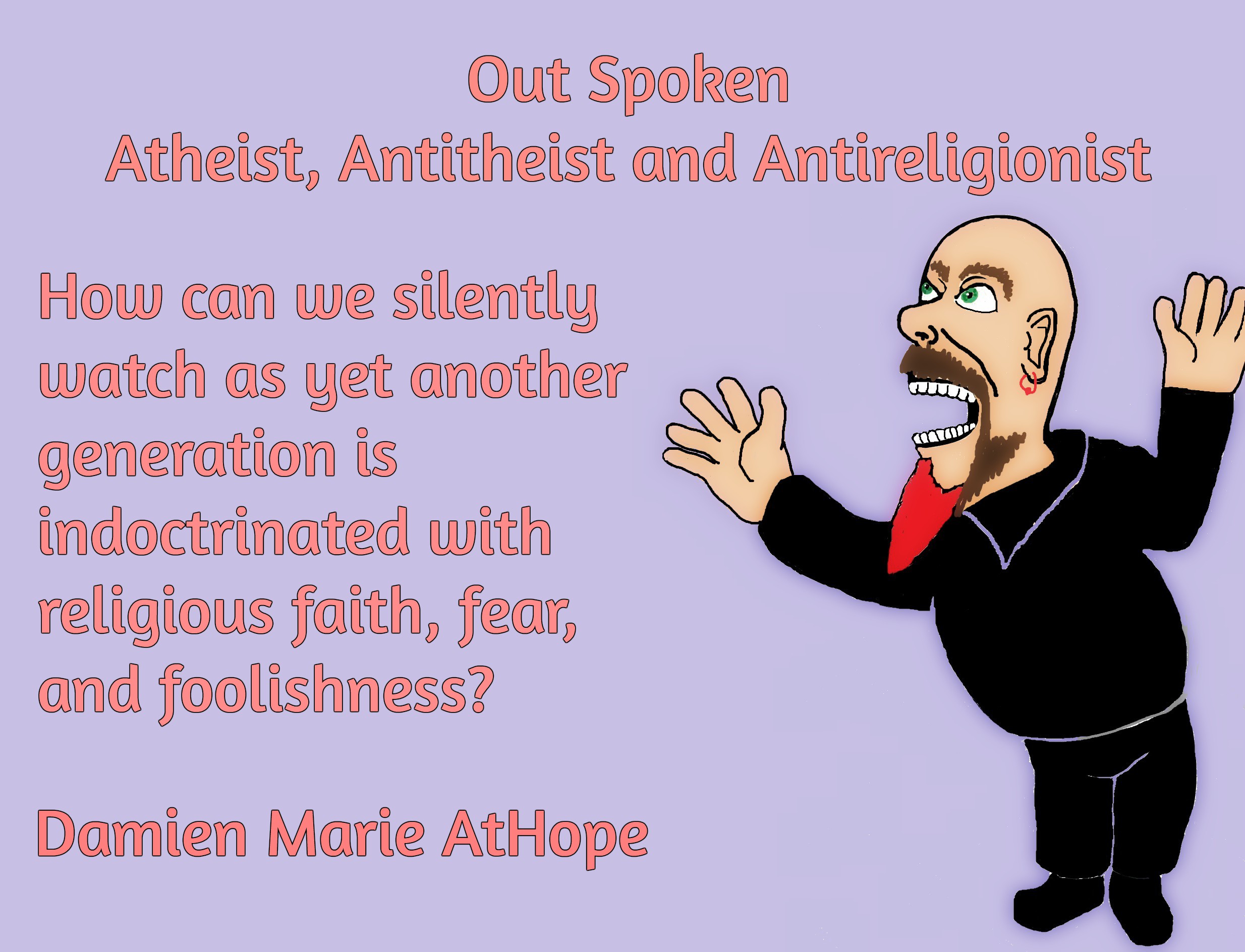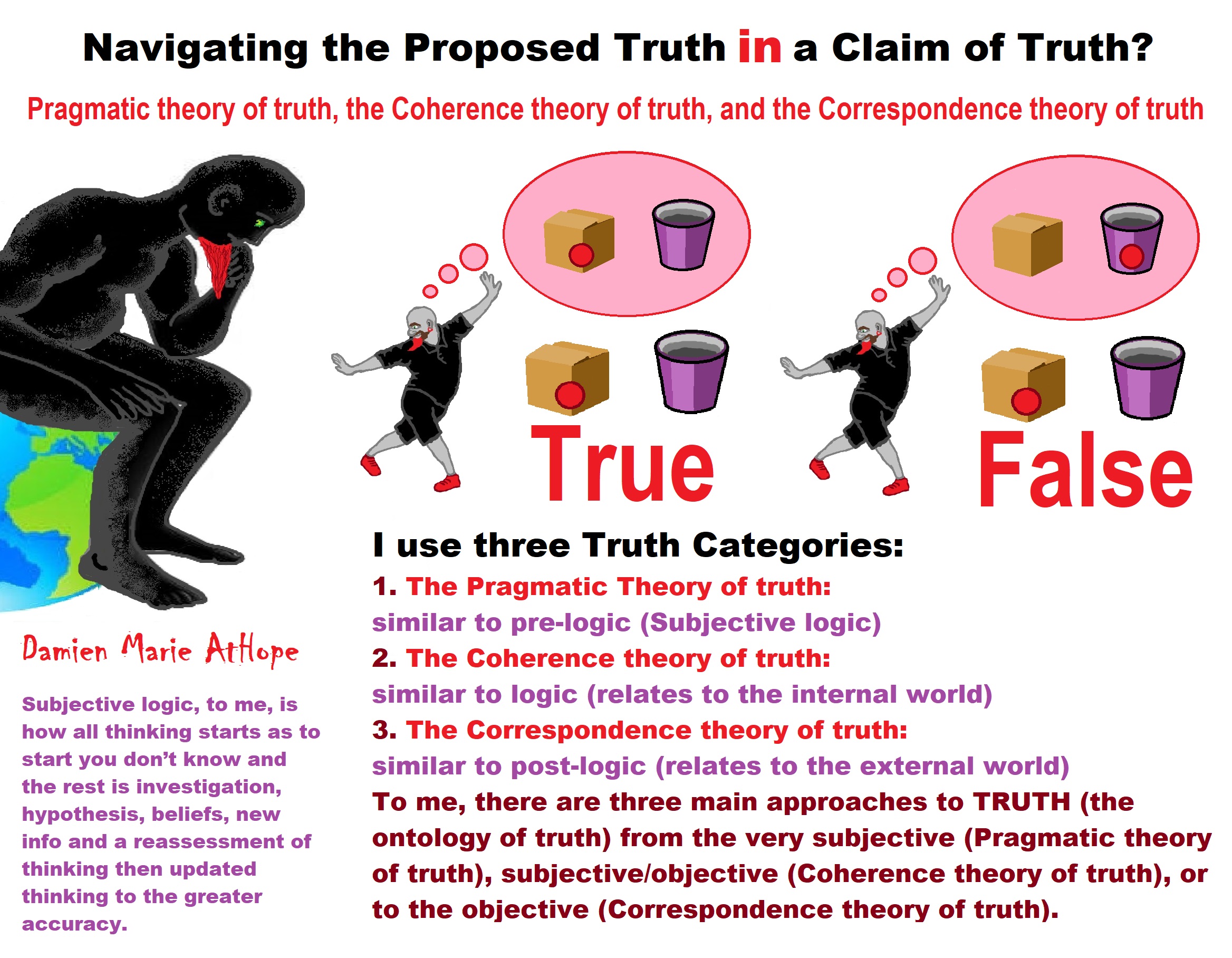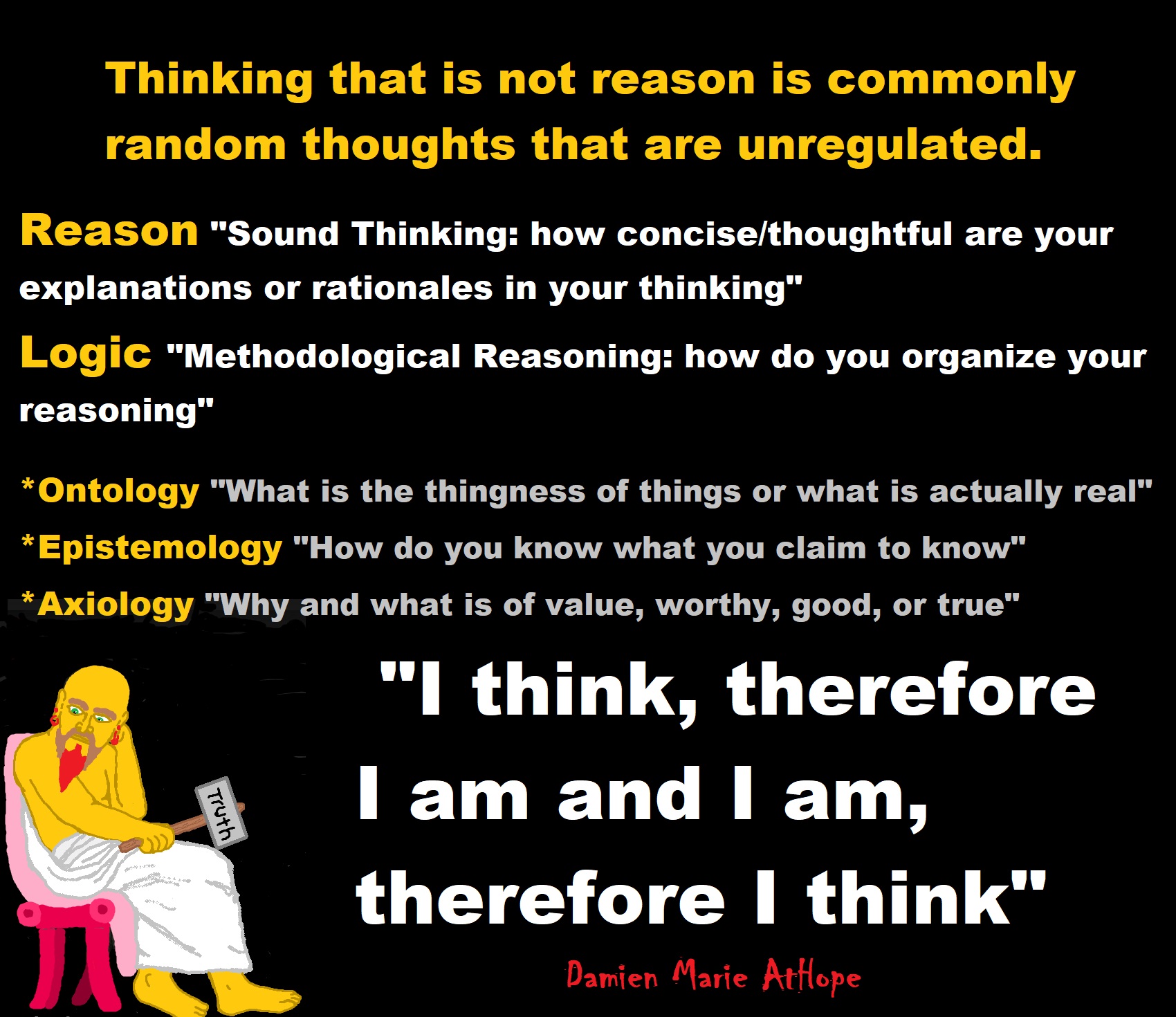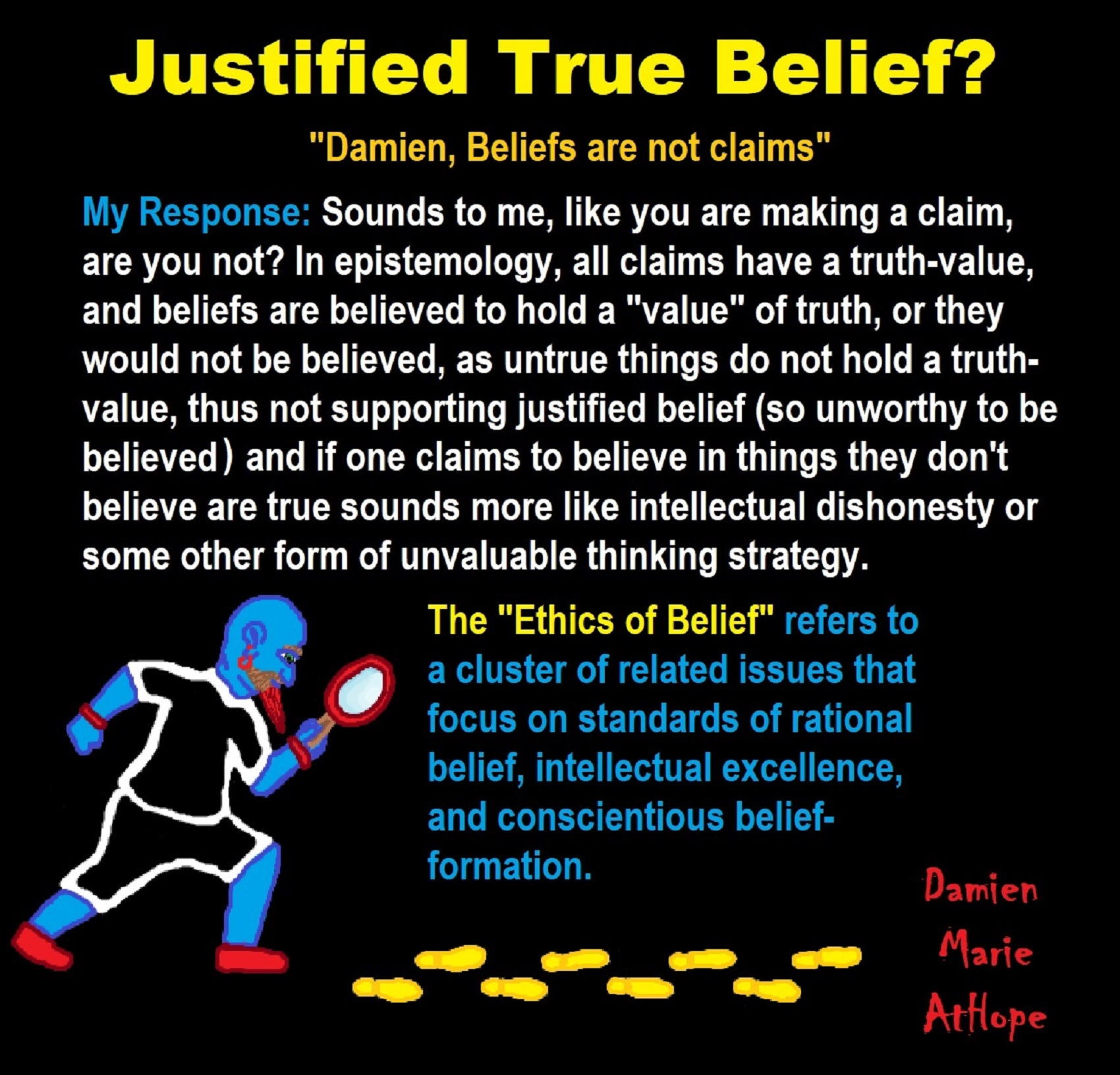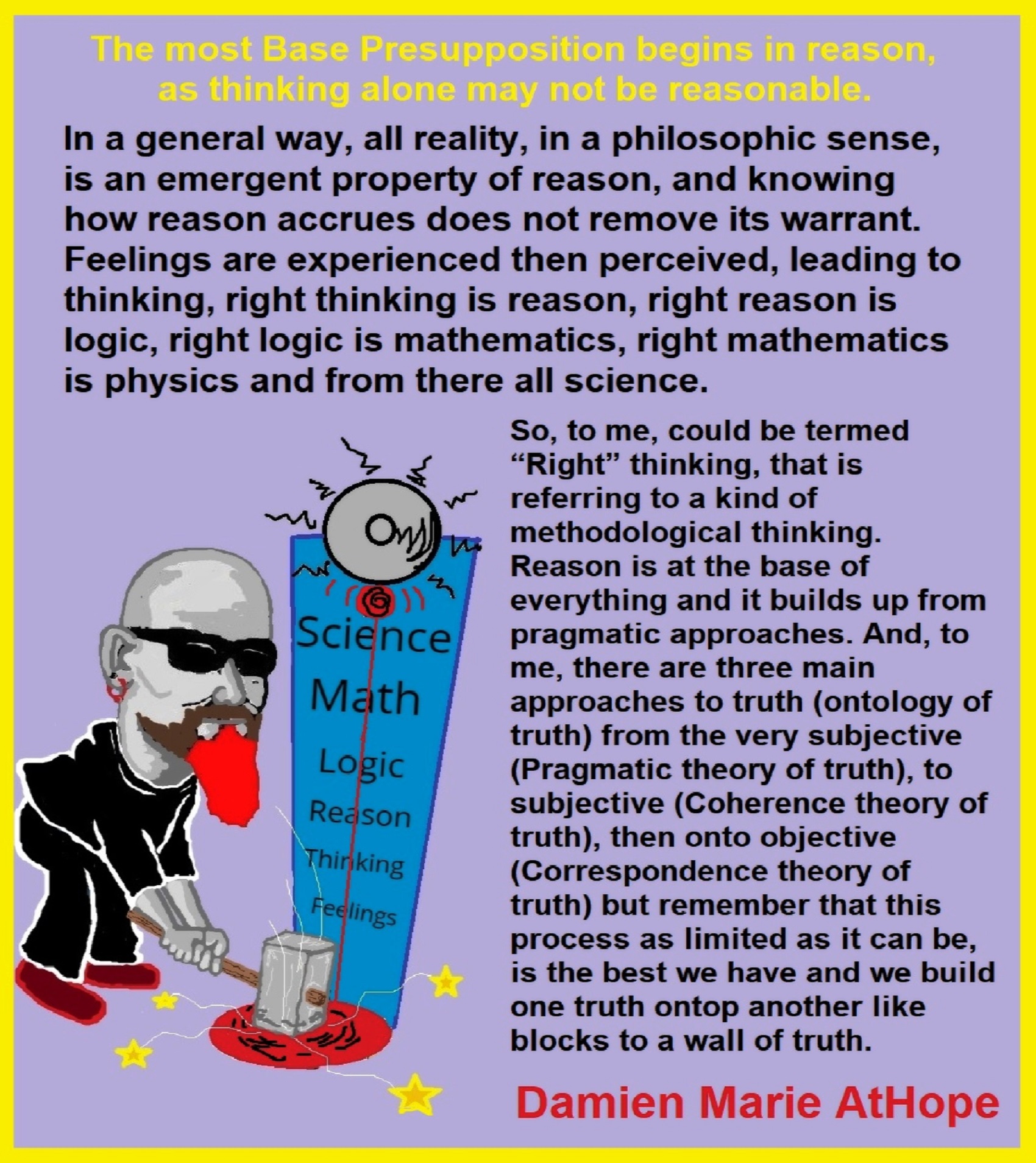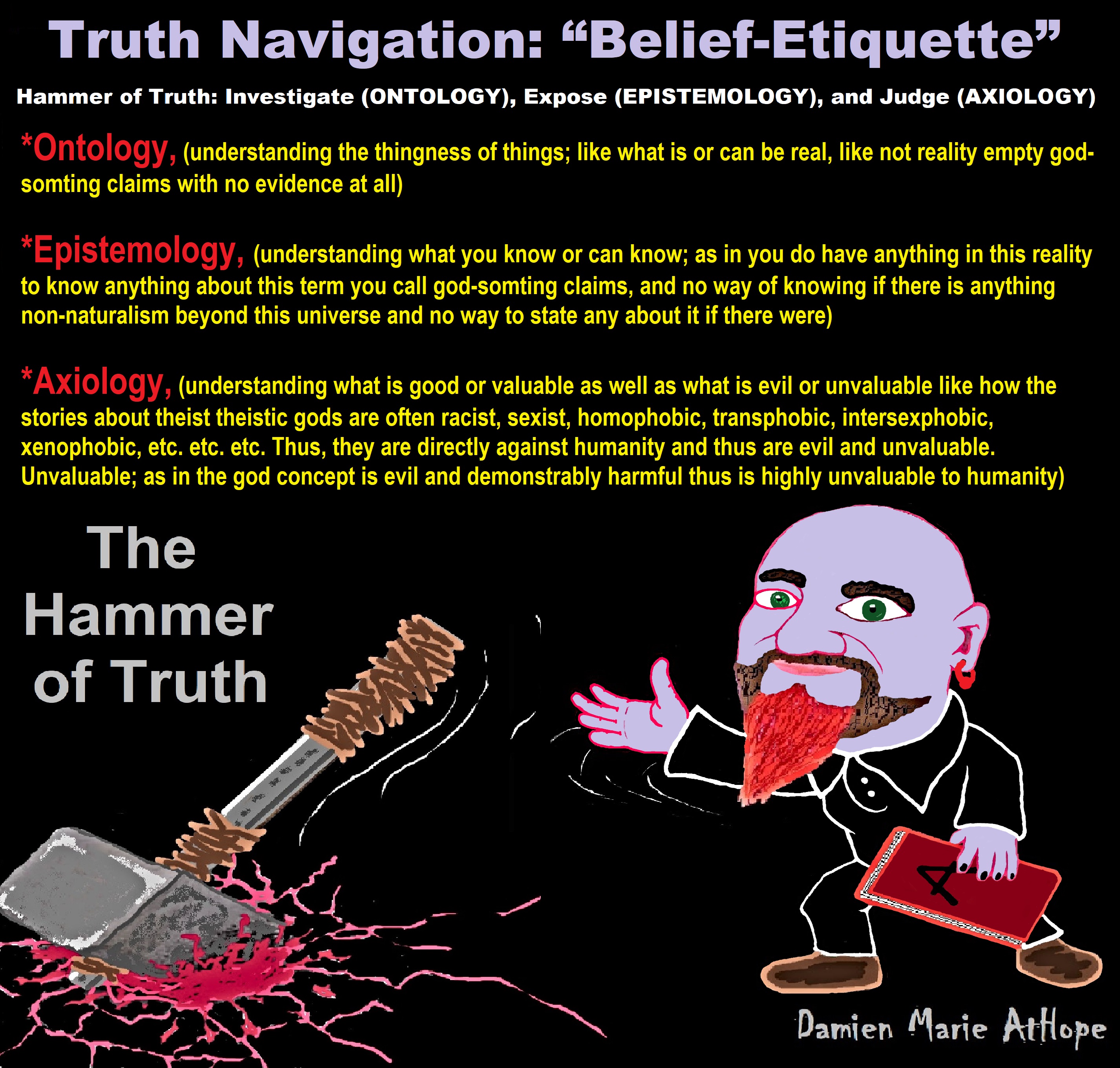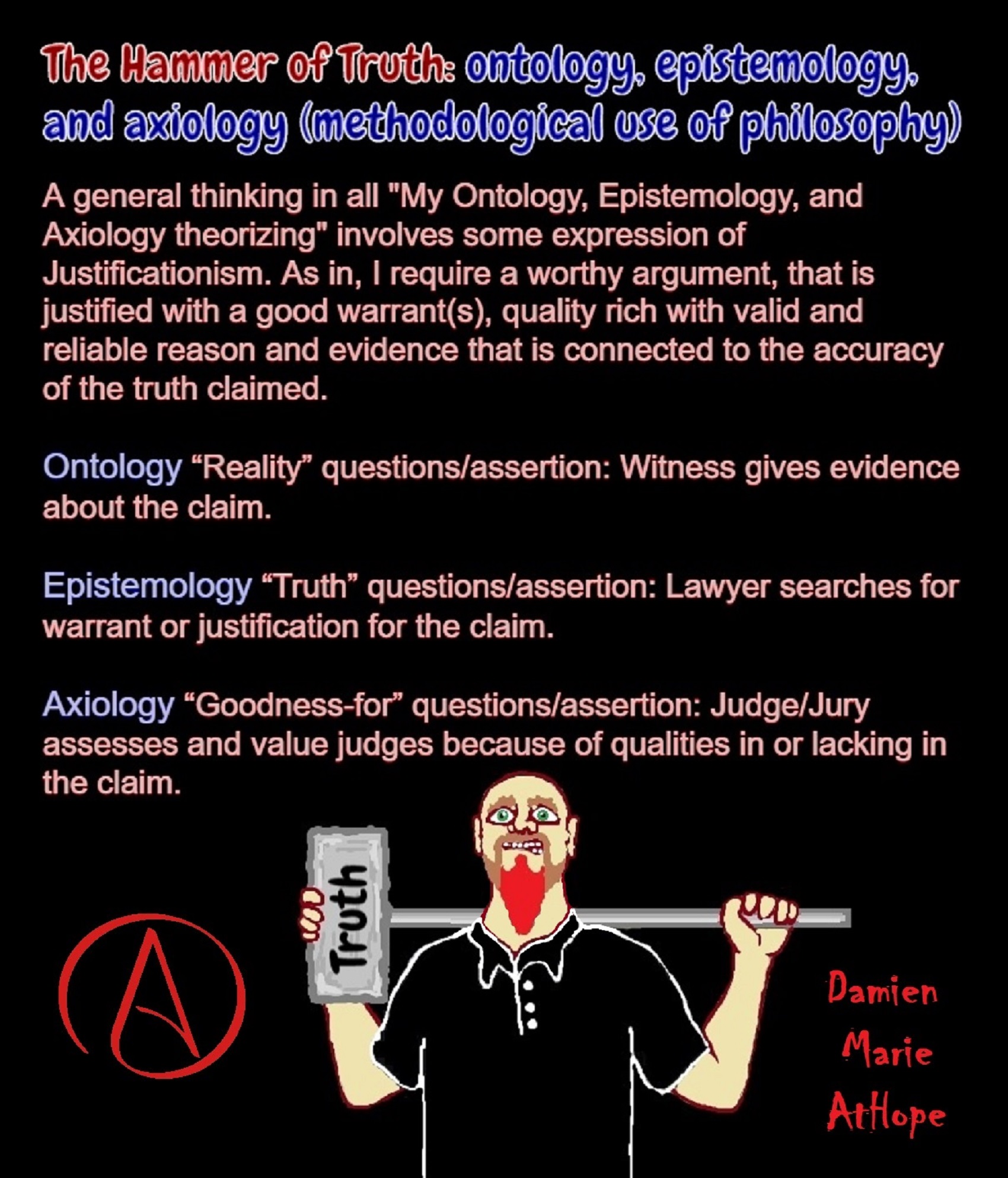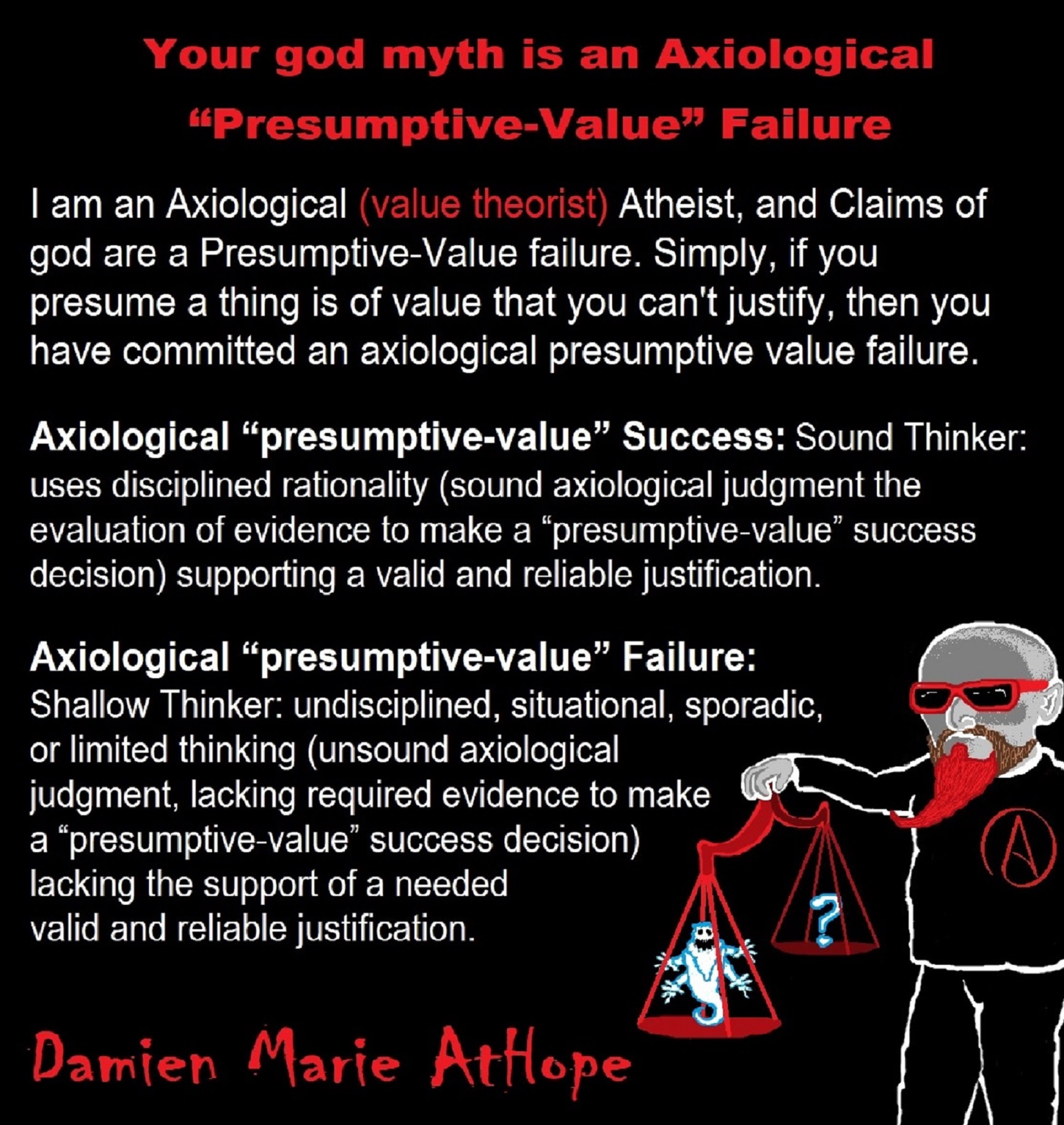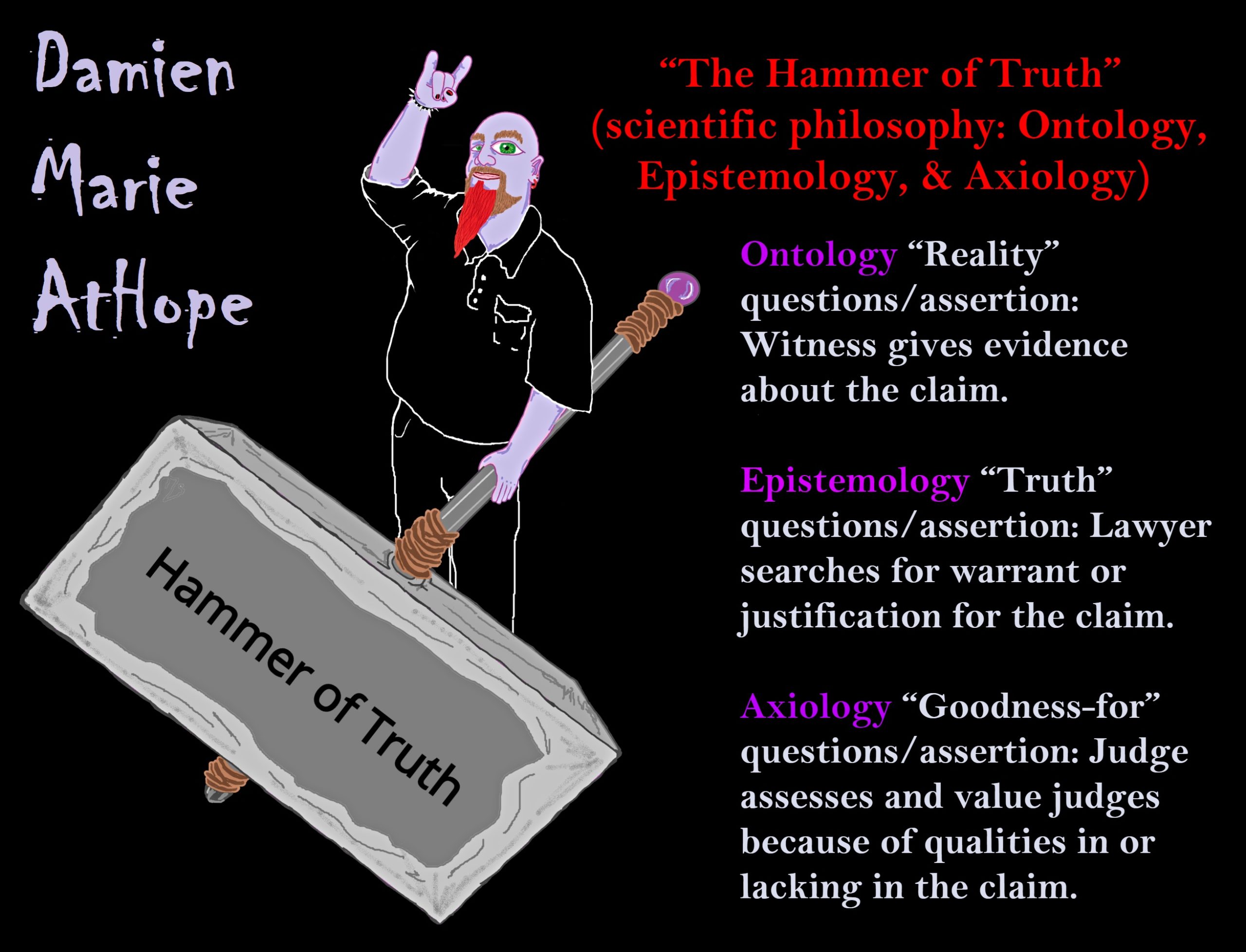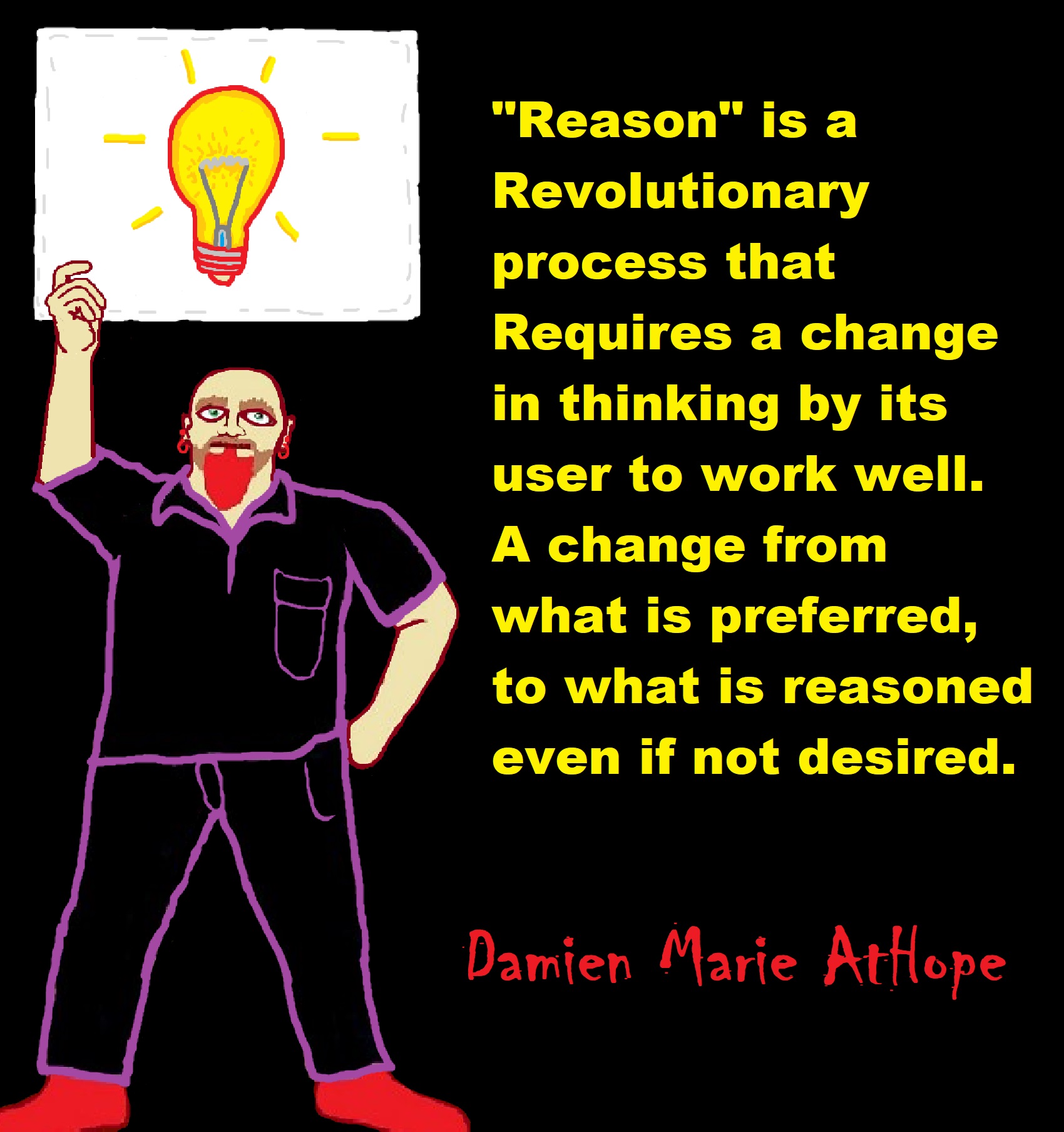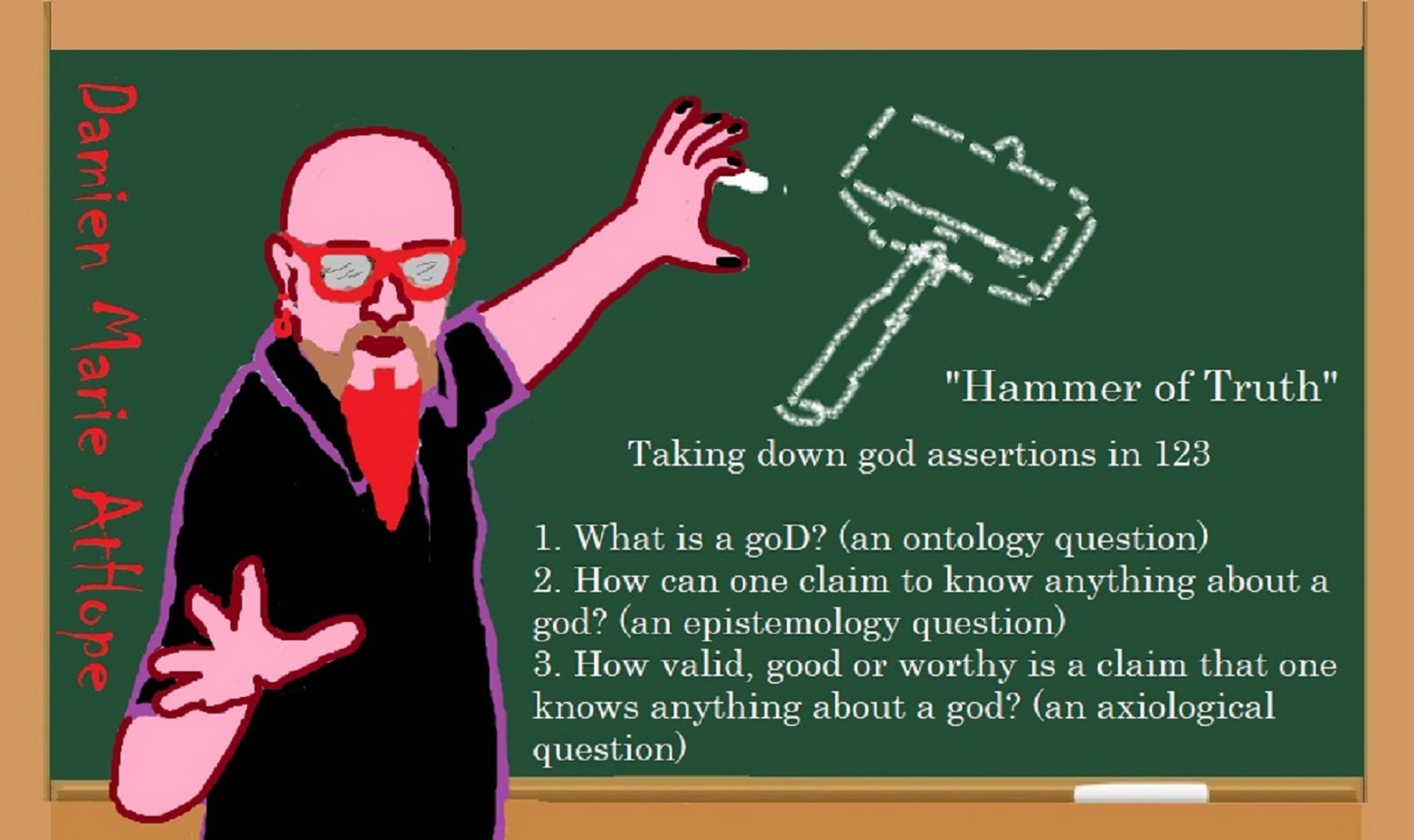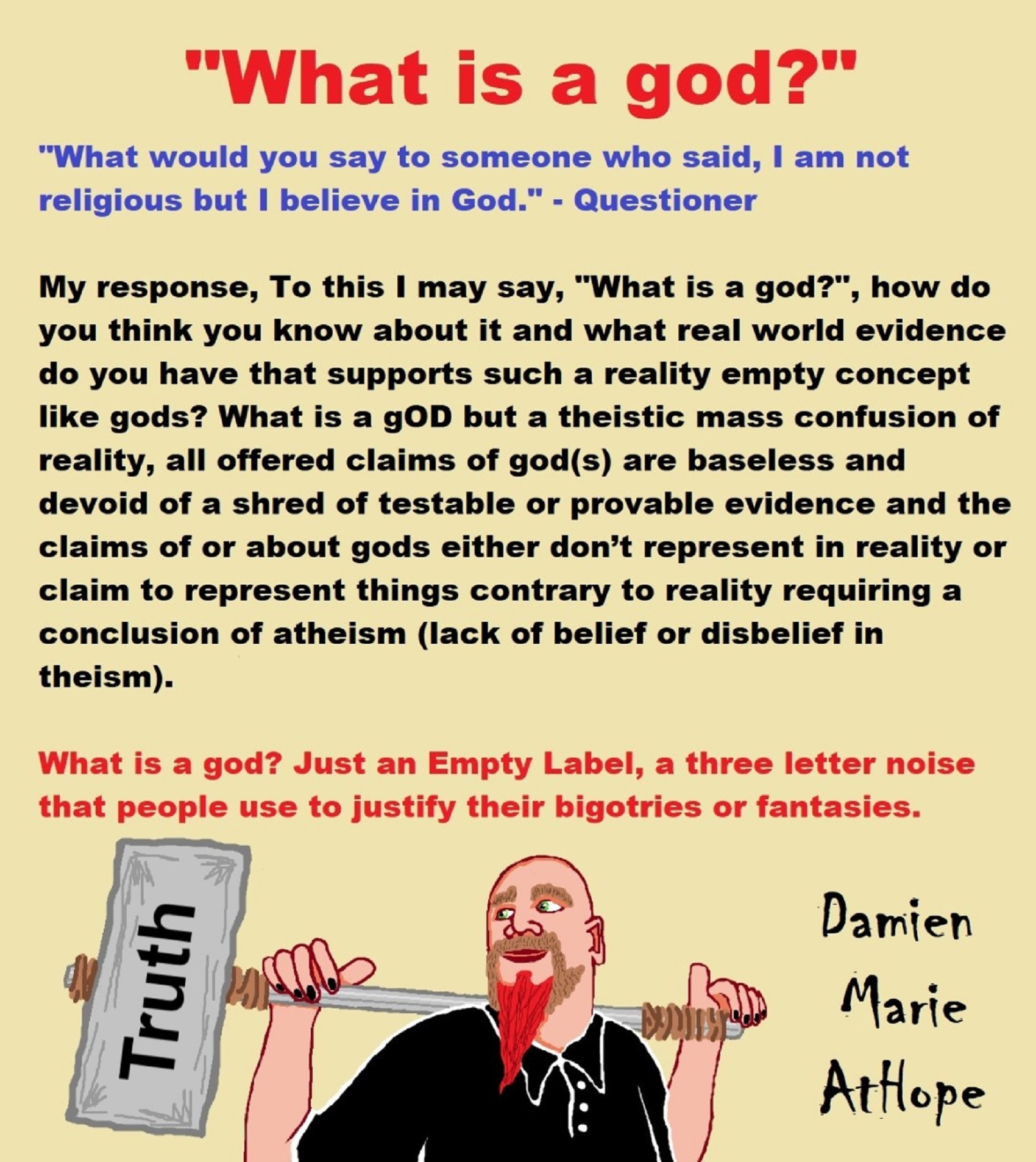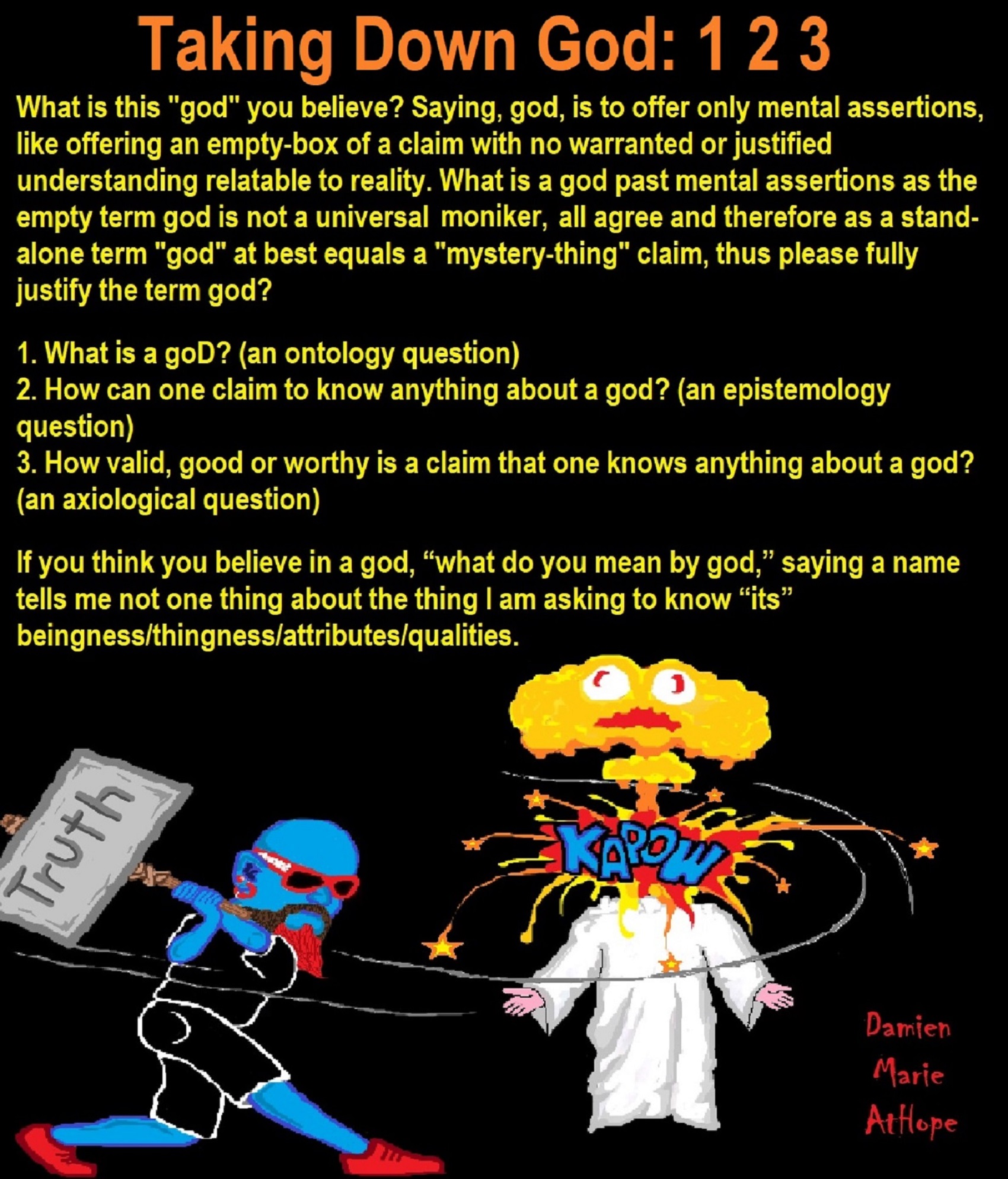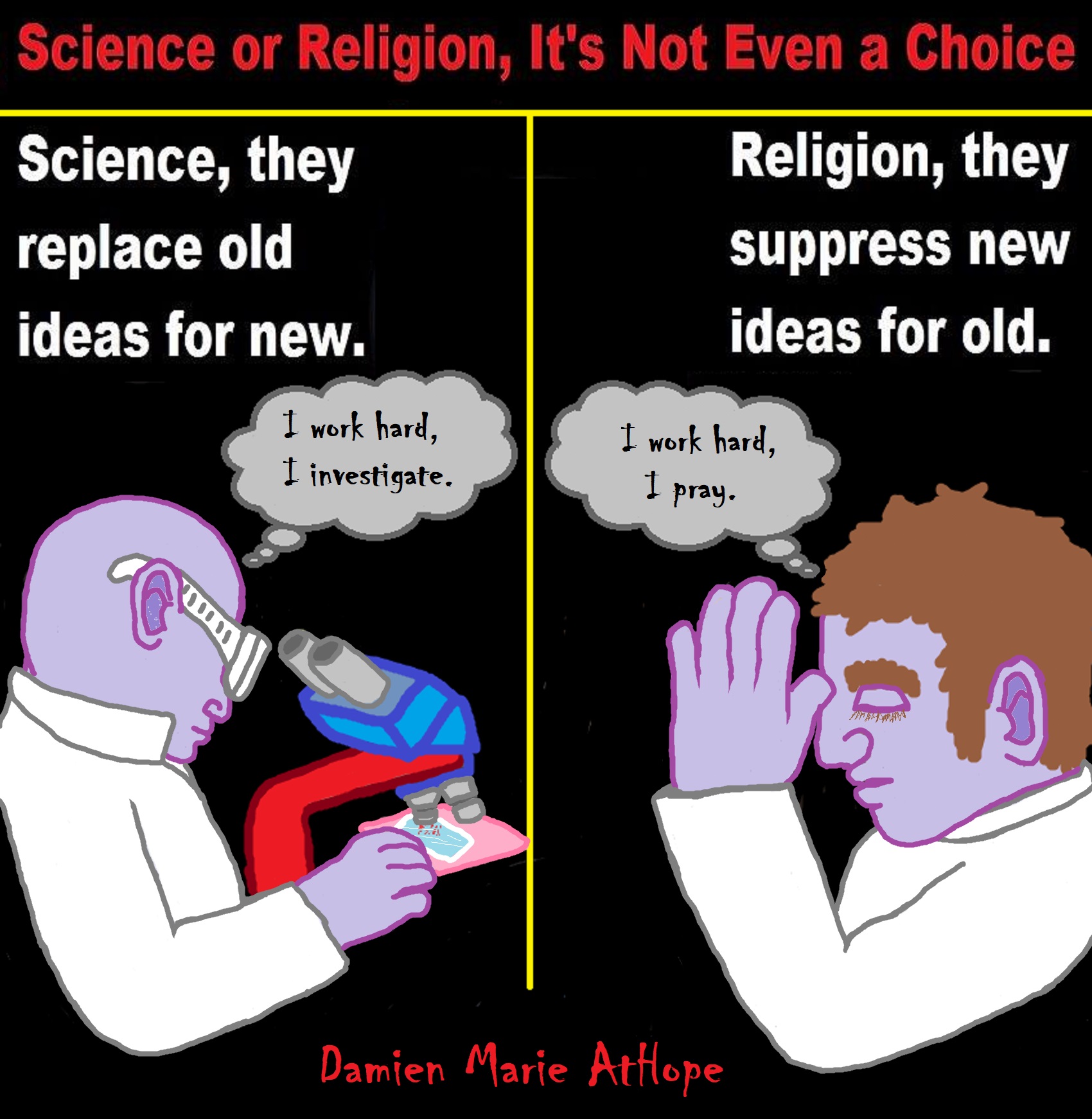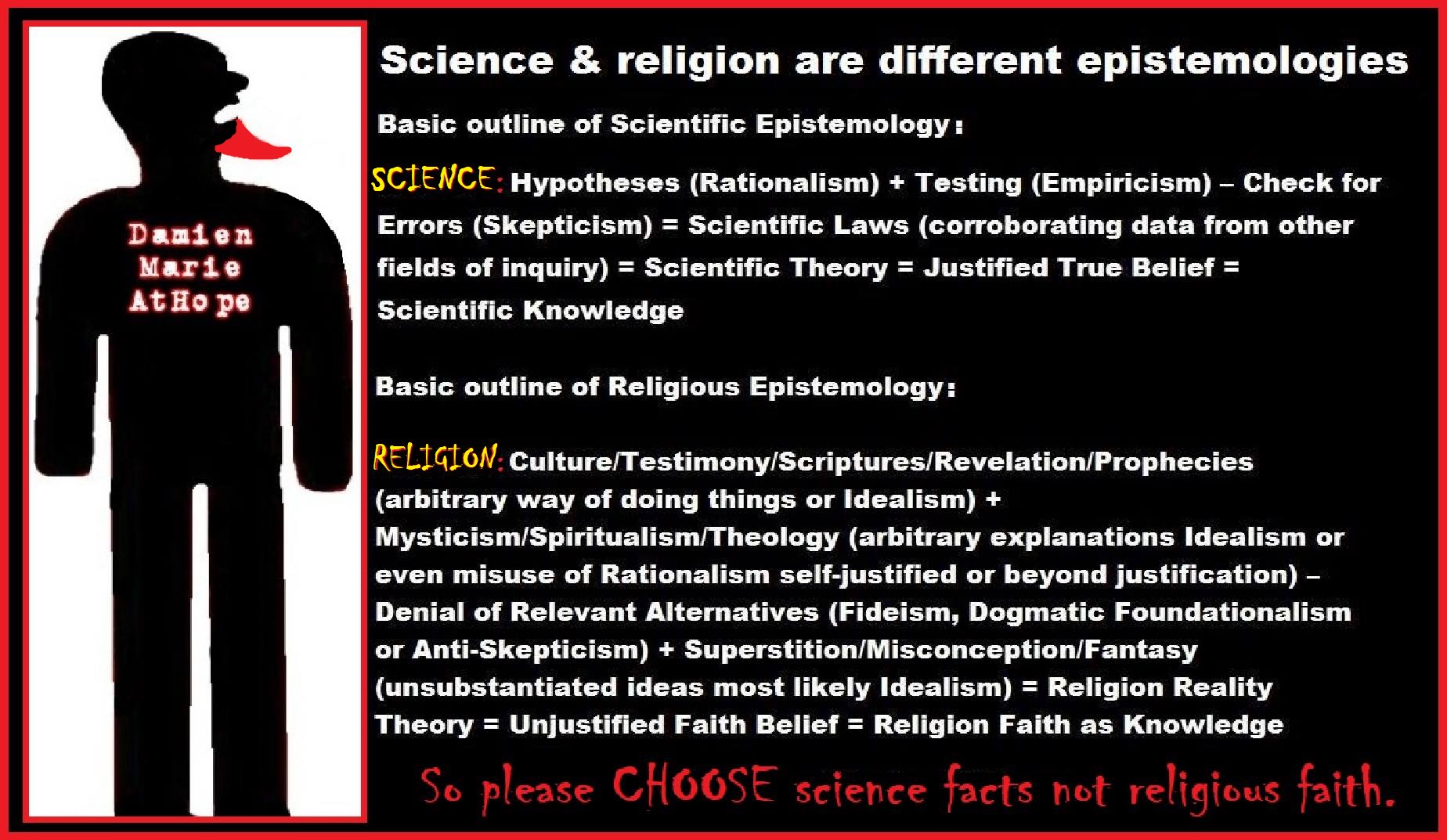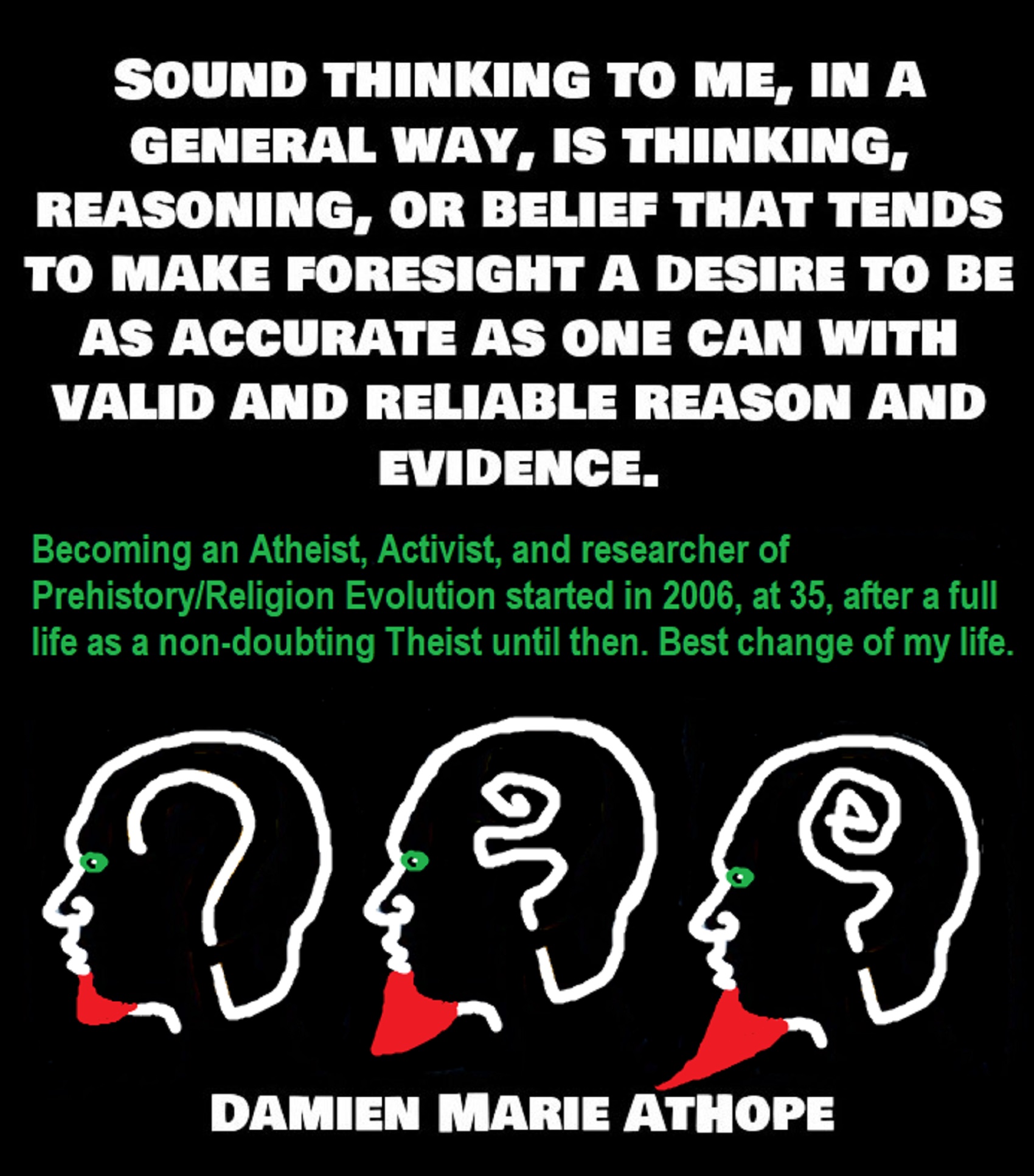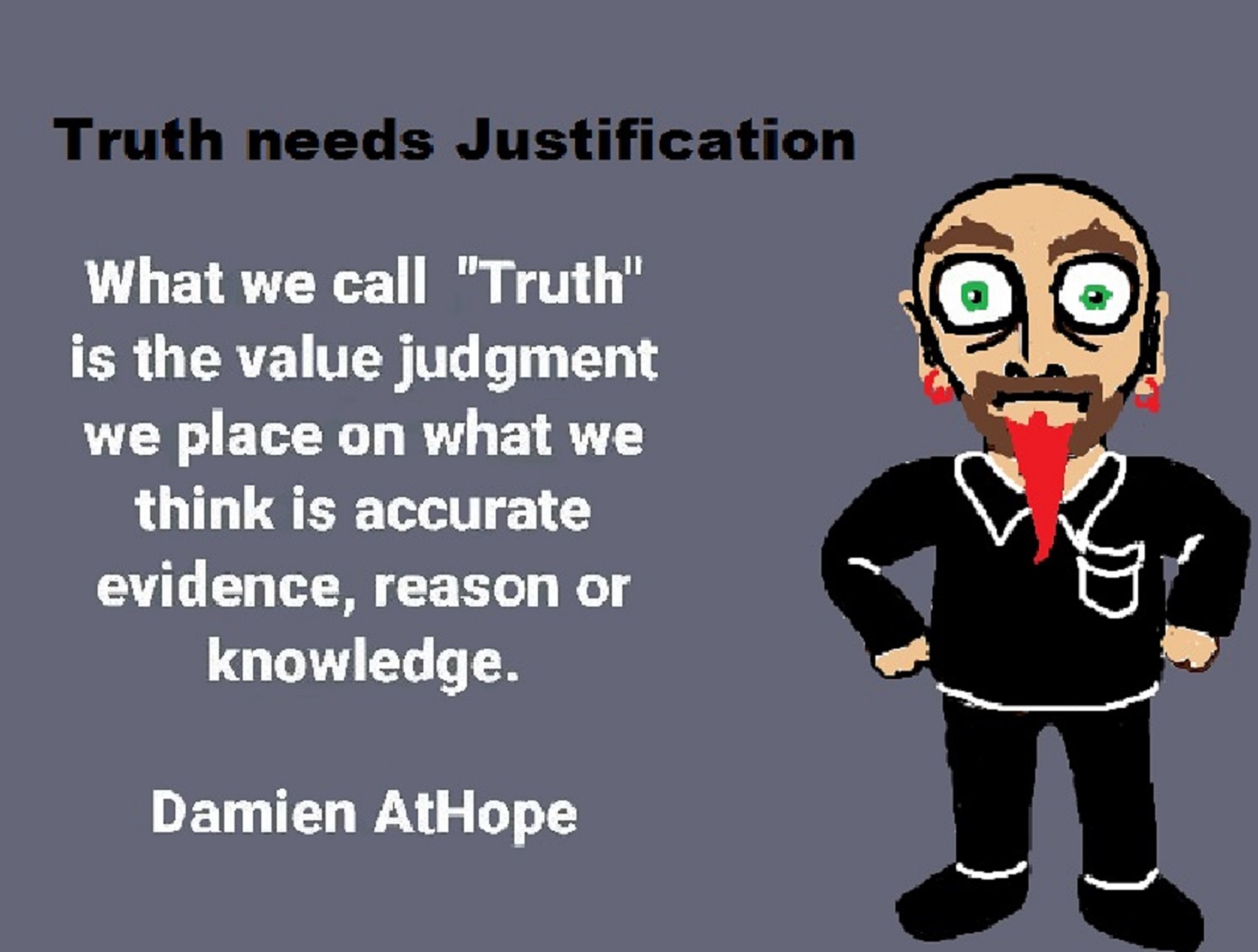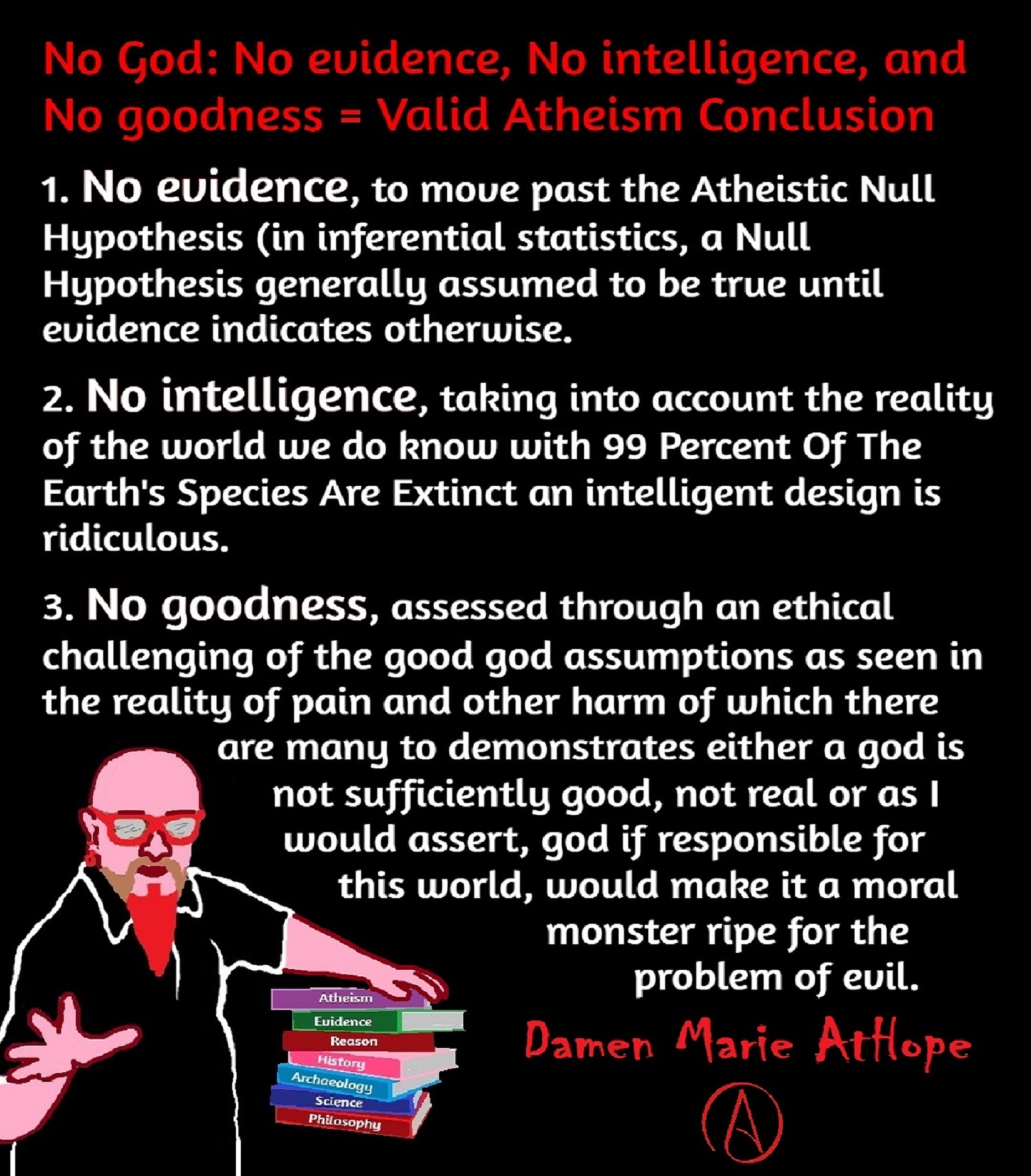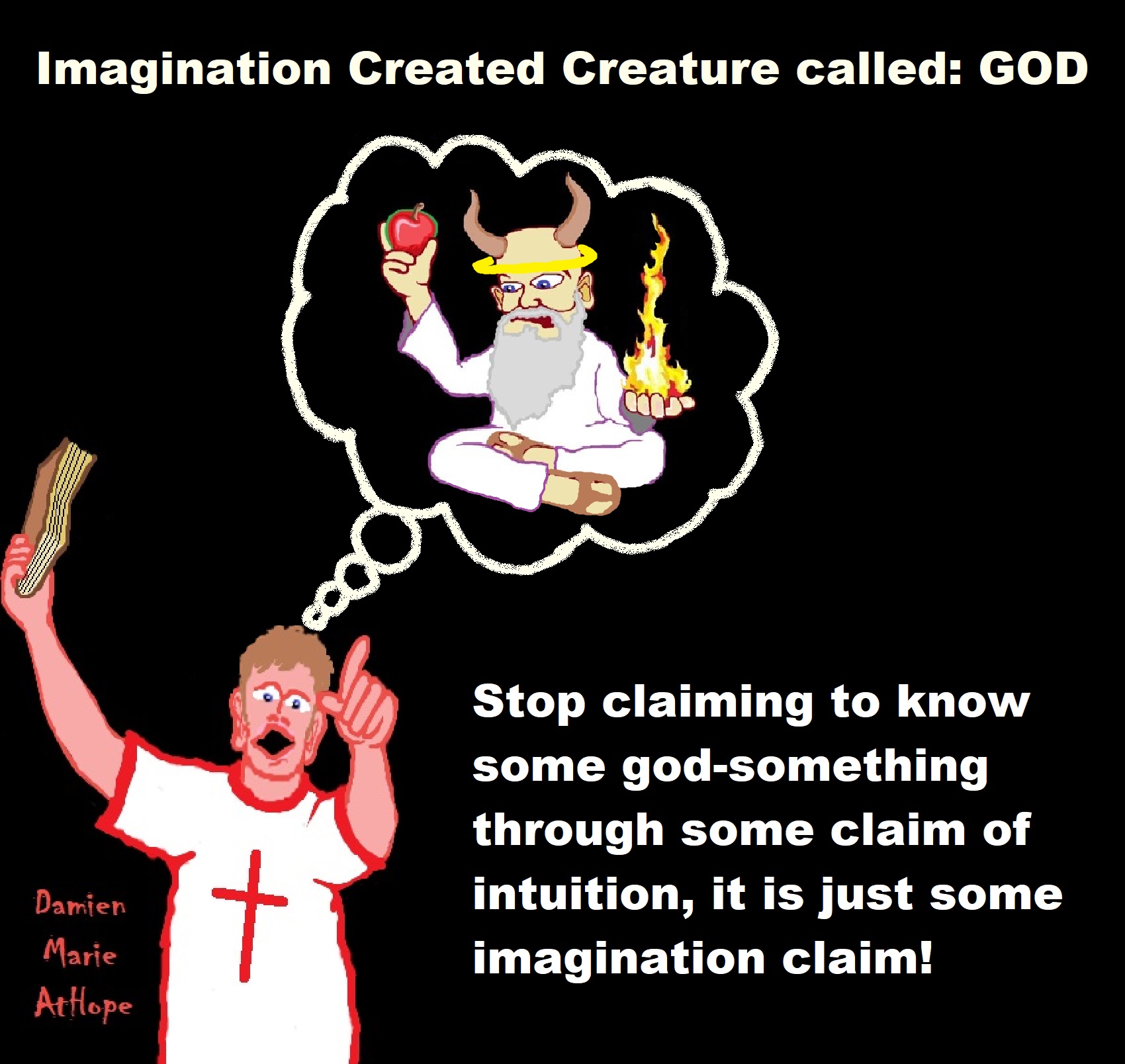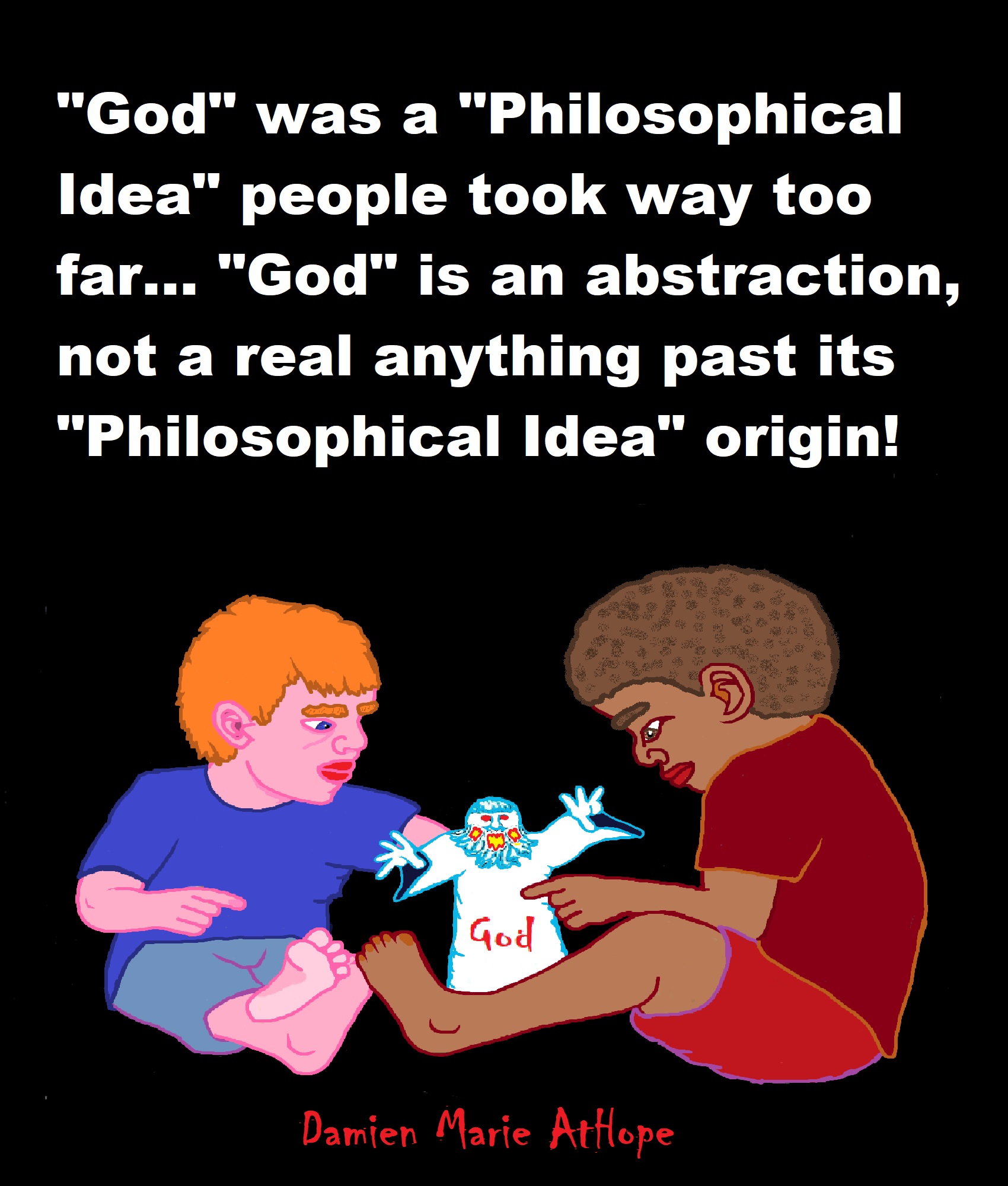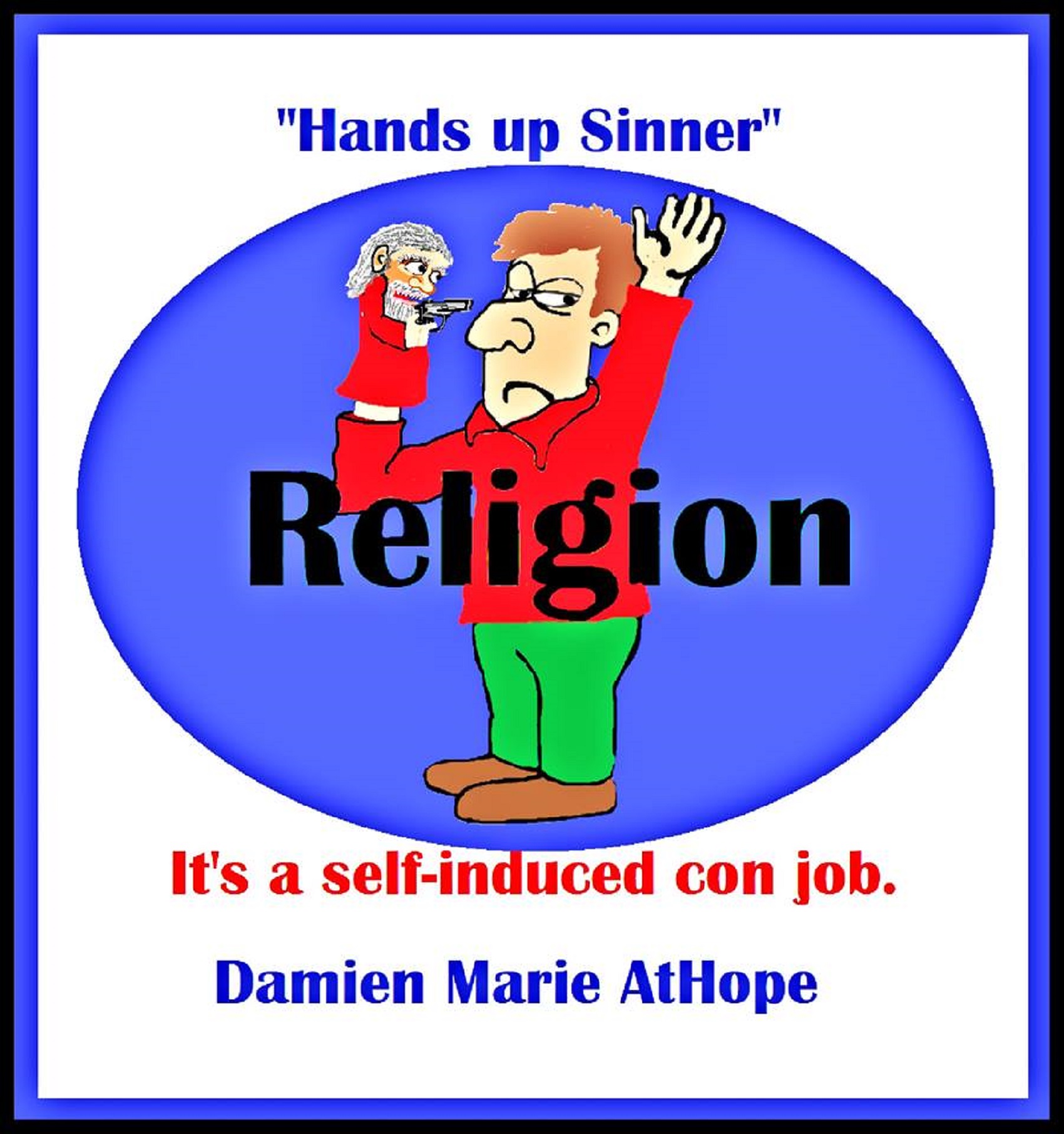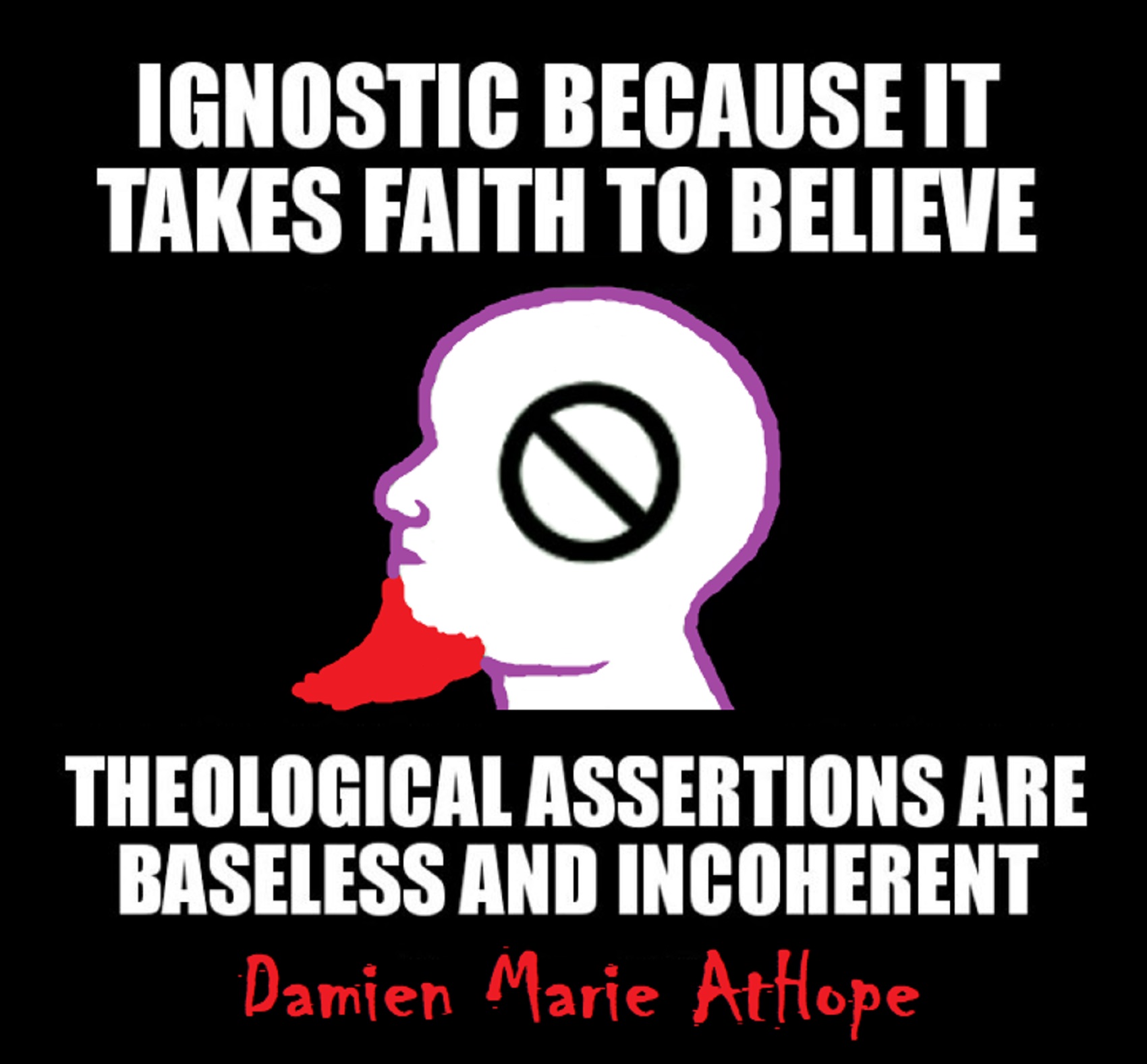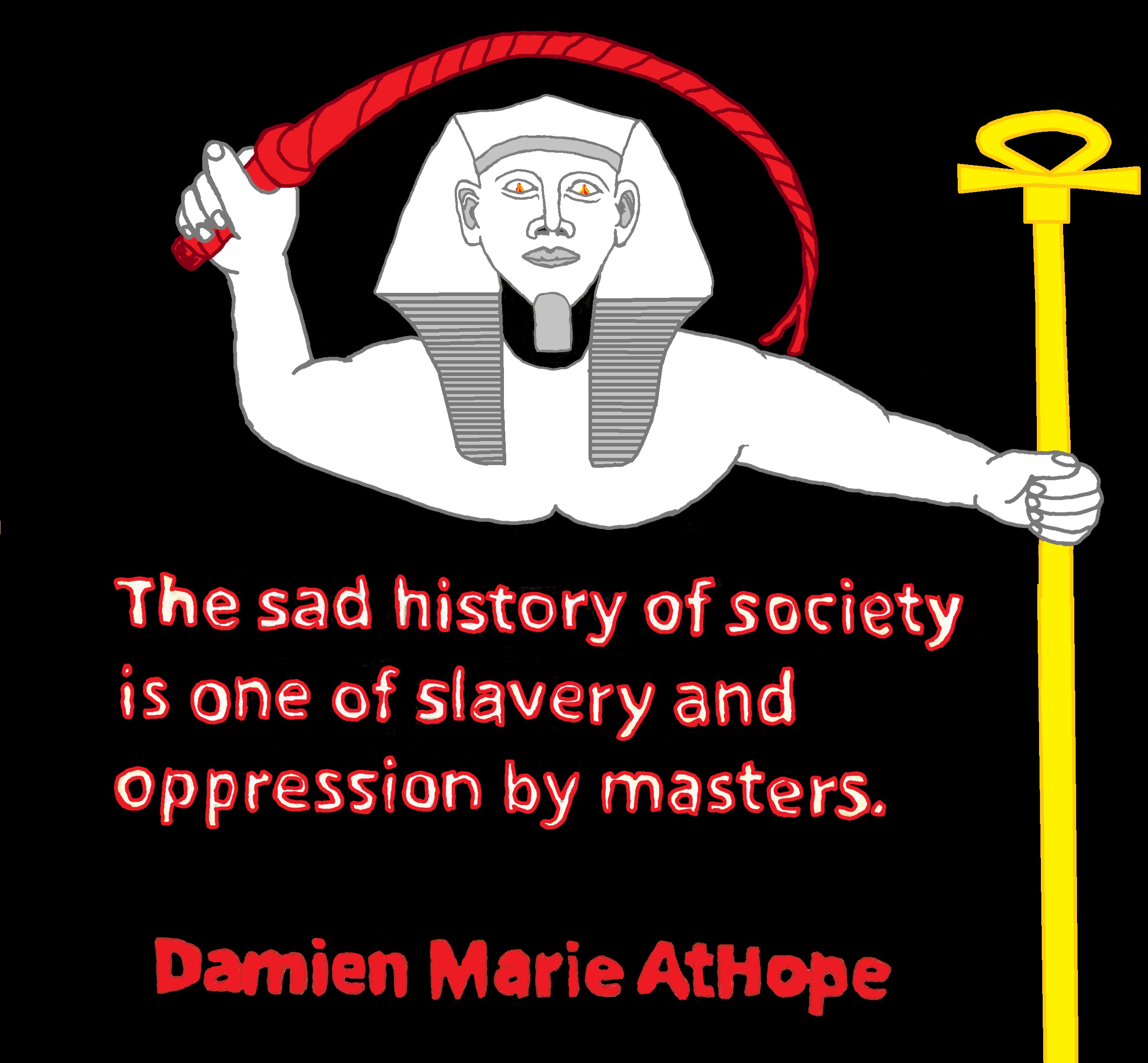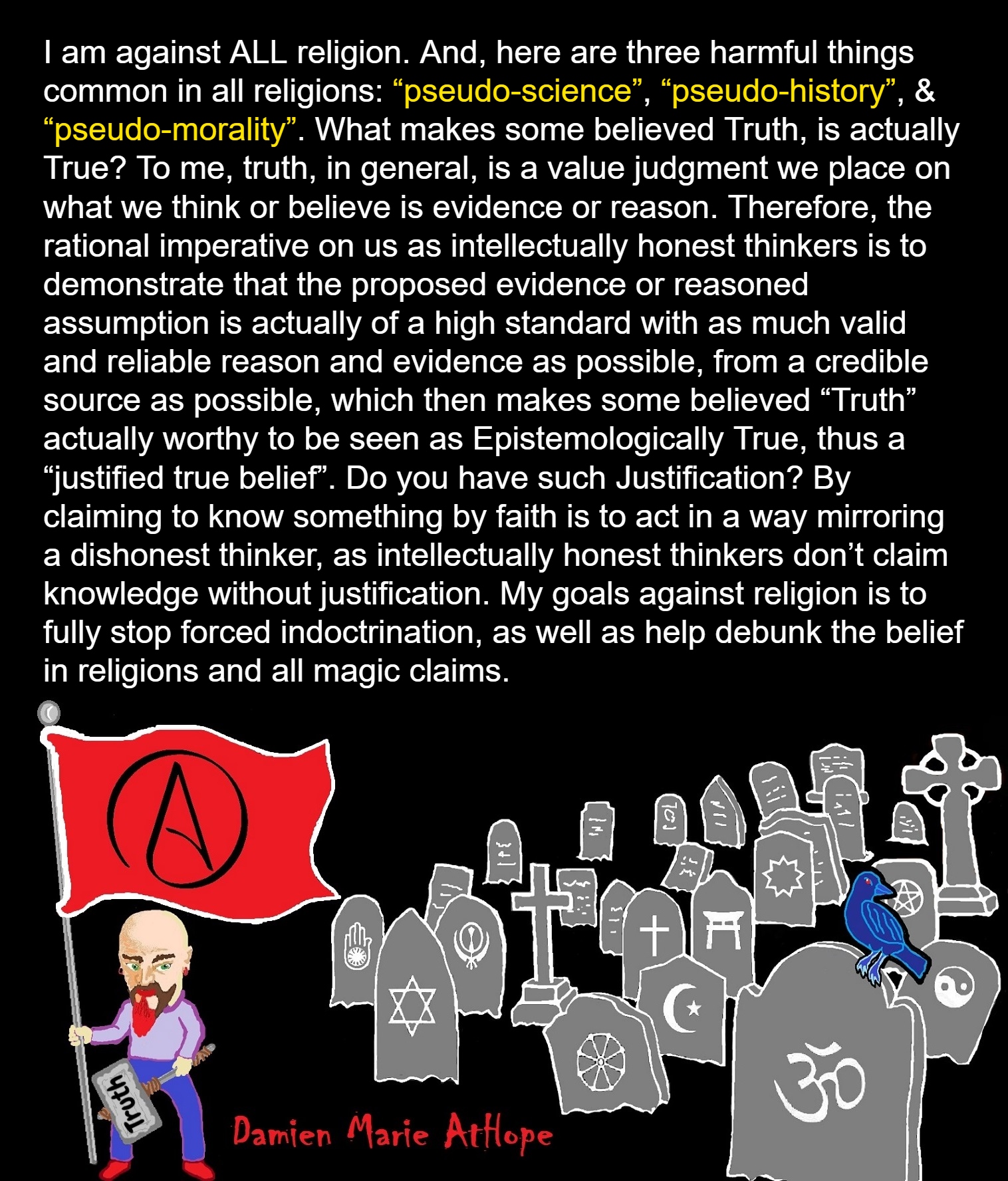I use a kind of Dialectical Rhetoric = truth persuasion (motivational teaching)
Error Crushing Force of the Dialectic Questions and the Hammer of Truth
My general Dialectic persuasion is a goal in all my truth seeking motivation over emotional hijacking reactions that can cloud right thinking. In this case an emotional thinking hijacking persuasion ie. anger trying to prove I am right and/or an all out goal of winning over clear thinking truth seeking. Some people think of Dialectic as the same as the Socratic method.
“The Socratic method, is a form of cooperative argumentative dialogue between individuals, based on asking and answering questions to stimulate critical thinking and to draw out ideas and underlying presuppositions. It is a dialectical method, involving a discussion in which the defense of one point of view is questioned; one participant may lead another to contradict themselves in some way, thus weakening the defender’s point.” ref
But I don’t really follow the Socratic method, as I feel it is limited for me, it mainly is a dialectical only approach, seeking truth without persuasion. Like most dialectical approaches, It is a form of cooperative dialogue to stimulate critical thinking and to draw out ideas and underlying presumptions. But I add Rhetoric to my use of Dialectics, thus my “Dialectical Rhetoric.”
Truth Navigation: Techniques for Discussions or Debates
I do truth navigation, both inquiry questions as well as
strategic facts in a tag team of debate and motivational teaching.
Truth Navigation and the fallacy of Fideism “faith-ism”
Compare ideas not people, attack thinking and not people. In this way, we have a higher chance to promote change because it’s the thinking we can help change if we address the thinking and don’t attack them.
My eclectic set of tools for my style I call “Truth Navigation” (Techniques for Discussions or Debates) which involves:
*REMS: reason (rationalism), evidence (empiricism), and methodological “truth-seeking” skepticism (Methodic doubt) (the basic or general approach)
*The Hammer of Truth: ontology, epistemology, and axiology (methodological use of philosophy)
*Dialectical Rhetoric = truth persuasion: use of facts and reasoning (motivational teaching)
*Utilizing Dignity: strategic dignity attacks or dignity enrichments (only used if confusion happens or resistance is present)
Asking the right questions at the right time with the right info can also change minds, you can’t just use facts all on their own. Denial likes consistency, the pattern of thinking cannot vary from a fixed standard of thinking, or the risk of truth could slip in. Helping people alter skewed thinking is indeed a large task but most definitely a worthy endeavor.
Error Crushing Force of the Dialectic Questions and the Hammer of Truth
Religions have undialectical rhetoric = pseudo-truth persuasion (indoctrination of dogmatic propaganda)
Hate the Dogmatic-Propaganda Not the People
Dogmatic-Propaganda Must not go Unchallenged
Religionists like to act as if it is they who are being persecuted when it is them forcing what and how they believe on others and asking stupid questions to atheists, such as, I do not understand why you cannot just let religion believers live and let live. I could say, I don’t understand why religious never has, nor ever will just live and let live. However, I already know why, they are Dogmatic-Propaganda that wishes self-replication and oppression of those who don’t fall in line and thus every ethical rational thinker must see this as the enemy to a civil humanity that it is, has been and will continue to be if left unchallenged.
Two Dogmatic-Propaganda Fallacies
Religionists and fideists promote Dogmatic-Propaganda whereas atheists and antireligionists mostly promote Disciplined-Rationality.
Dogmatic–Propaganda commonly is a common motivator of flawed or irrational thinking but with over seventy belief biases identified in people, this is hardly limited to just the religious or faith inclined.
Let me illustrate what I am saying, to me all theists are believing lies or irrationally in that aspect of their lives relating to god belief. So the fact of any other common intellectual indexers where there may be right reason in beliefs can not remove the flawed god belief corruption being committed. What I am saying is like this if you kill one person you are a killer. If you believe one god you are a follower of Dogmatic-Propaganda and can not completely be a follower of Disciplined-Rationality.
However, I am not proclaiming all atheists are always rational as irrationally is revolving door many people believer or otherwise seam to stumble through. Its just that god belief does this with intentionally.
Disciplined-Rationality is motivated be principles of correct reasoning with emphasis on valid and reliable methods or theories leading to a range of rational standpoints or conclusions understanding that concepts and beliefs often have consequences thus hold an imperative for truth or at least as close to truth as can be acquired rejecting untruth. Disciplined-Rationality can be seen as an aid in understanding the fundamentals for knowledge, sound evidence, justified true belief and involves things like decision theory and the concern with identifying the value(s), reasonableness, verification, certainties, uncertainties and other relevant issues resulting in the most clear optimal decision/conclusion and/or belief/disbelief. Disciplined-Rationality attempts to understand the justification or lack thereof in propositions and beliefs concerning its self with various epistemic features of belief, truth, and/or knowledge, which include the ideas of justification, warrant, rationality, reliability, validity, and probability. ref , ref
Religion vs. Science
Don’t Confuse Beliefs
Science is a system where justified true beliefs are derived from objective methodologies such as the scientific method and religion is a system of unjustified beliefs based on subjective faith or revelation. We must not confuse beliefs, religion is beliefs built from myths devoid of corroborating evidence. Science uses corroborating evidence to establish what is true and that offers something worthy to believe. Modern Science is not a thing, it’s a group of different specialties aiming to test (generally with the scientific method) and try to figure out the world as it presents itself in reality, which is devoid of supernatural magic.
We must not confuse beliefs, religion is beliefs from myths devoid of corroborating evidence or reason. Whereas, science uses as well as demands corroborating evidence and reason to establish what is true and that offers something worthy to believe in. Thus, we have a belief without valid and reliable warrant or justification, so it’s an issue involving religion believers violating the ethics of belief. Do you believe in god? What is a god? When someone asks me if I believe in gods I think, are you asking me if magic exists? Well my answer as an ignostic atheist is, first prove the actuality of simple magic before you try to ask anyone about the possibility of some supreme magic, i.e. the claims of gods. So, let’s recap, likely no religion follower is honestly going to stop belief because of lack of evidence or reason, or they would have already done so. Just as no science follower is honestly going to start believing something if it has a lack of evidence or reason. Remember, we honest thinkers need to adhere to beliefs in an ethical way, like exhibit good belief etiquette: reasoned belief-acquisitions, good belief-maintenance, and honest belief relinquishment. I can’t stand when people try to say that atheism and religion use faith. We atheists, have archaeology that proves religion is a lie, so no faith is needed. Moreover, We atheists, have science which shows that every mystery has ever turned out to be nature and not magic. There is nothing that the only explanation is magic or supernatural anything, so for religion it has no evidence at all. All religion has is faith without any proof and do not try to say that atheism is anything like that. Promoting religion as real is mentally harmful to a flourishing humanity. To me, promoting religion as real is too often promote a toxic mental substance that can divide a person from who they are shaming them for being human. In addition, religion is a toxic mental substance that can divide a person from real history, real science or real morality to pseudohistory, pseudoscience and pseudomorality. Moreover, religion is a toxic mental substance that can divide a person from rational thought, critical thinking, or logic. Likewise, religion is a toxic mental substance that can divide a person from justice, universal ethics, equality, and liberty. Yes, religion is a toxic mental substance that can divide a person from loved ones, and religion is a toxic mental substance that can divide a person from humanity. Therefore, to me, promoting religion as real is too often promote a toxic mental substance that should be rejected as not only false but harmful as well even if you believe it has some redeeming quality. To me, promoting religion as real is mentally harmful to a flourishing humanity. Religion may have once seemed great when all you had or needed was to believe. Science now seems great when we have facts and need to actually know. I proudly reject all gods and religions. It should be understood, that religion as well as its love of gods, must be seen for what they are, which beyond their pomp and circumstance are exposed as little more than indoctrinated cultural products, the conspiracy theories of reality no one should believe today in our world of science. Simply, religion and its gods are the leftovers of an ignorant age trying to explain and control a fearful world which seems now favored by the uninformed, misinformed, emotional/physical/social support seekers and conmen. To me, a rational mind values humanity and rejects religion and gods as real until valid and reliable reason and evidence that passes scientific consensus that what is being offered is as it is claimed, so no belief without proof. A truly rational mind sees the need for humanity, as they too live in the world and see themselves as they actually are an alone body in the world seeking comfort and safety. Thus, see the value of everyone around them as they too are the same and therefore rationally as well a humanistically we should work for this humanity we are part of and can either dwell in or help its flourishing as we are all in the hands of each other. You are Free to think as you like but REALITY is unchanged. While you personally may react, or think differently about our shared reality (the natural world devoid of magic anything), We can play with how we use it but there is still only one communal reality (a natural non-supernatural one), which we all share like it or not and you can’t justifiably claim there is a different reality. This is valid as the only one of warrant is the non-mystical natural world around us all, existing in or caused by nature; not made or caused by superstitions like gods or other monsters to many sill fear irrationally.
Do Beliefs Need justification?
Yes, it all requires a justification and if you think otherwise you should explain why but then you are still trying to employ a justification to challenge justification. So, I still say yes it all needs a justification and I know everything is reducible to feeling the substation of existence. I feel my body and thus I can start my justificationism standard right there and then build all logic inferences from that justified point and I don’t know a more core presupposition to start from. A presupposition is a core thinking stream that like how a tree of beliefs always has a set of assumed sets of presuppositions or a presupposition is relatively a thing/thinking assumed beforehand at the beginning of a line of thinking point, belief projection, argument or course of action. And that as well as everything needs justification to be concluded as reasonable. Sure, you can believe all kinds of things with no justification at all but we can’t claim them as true, nor wish others to actually agree unless something is somehow and or in some way justified. When is something true that has no justification? If you still think so then offer an example, you know a justification. Sure, there can be many things that may be true but actually receiving rational agreement that they are intact true needs justification. Remembering my past, it all goes back to such troubles, which were so dark as was my mind, it was like being dead while alive. I had made my life unclean with excessive or even exclusive concern, for myself, my own advantage, and relatively my own pleasure regardless of the welfare of others or with little concern for them. Limited in caring I looked only for me, me, me getting what I could take from life not what I could give and was almost drowning in selfishness and pain. Trying to have fun no matter the cost. I was left feeling worthless. I needed something for my insides felt empty. I was like a screen smeared with darkness of selfness. My hearts tongueless words sang of my despair. My dark mind felt lost in a crowd. I needed to do something. It is as if my log lost empathy start to feel a call. Yes, I started to see past the mountain of me that strong and selfish tree. Something is changing. It’s as if my inner being has a mind of its own or it cries out for change. Bright life seems at hand by caring, to feel the connection not just with others but indeed a new and welcoming empathetic new me. I now seek that sweet day of caring connection and stop this night only selfishness bent on care of only me. My frozen shell shatters. It is hard to trust, but I must and seek others to help. I cried out, and listened to my need for change for the first time! I want to be more than my dark mind and self-limited life. I want to be my bright emotional wellbeing! Then joy spring forth in my every fiber mind and inner being. It’s as if I am on fire. Hope touch like a flame is was a soft breath that sets me free. I feel it, my bright inner thinking of love and care I now live in me adding to the freedom in the world. I may still have at times have a dark mind but have now created a bright life full of concern for the welfare of myself and others. I wish you to a bright life especially if you to suffer with a dark mind. However, when I was young I raged at the world, for abuse I received from my religious parents. Then I developed some, so I held my parents accountable, raging at them and the world; as so much was out there, like them. Then I fully developed and became an atheist, thus I started to see my parents were two different versions of christofascism (christian and fascism), as well as I saw that relatively all religions in some way are part of religiofascism (religion and fascism) especially how they often force hereditary religion of children by cursive force or oppression and I became an antireligionist atheist raging against religion as well as the lies of gods.
Religion and Science are Completely Different Epistemologies
The Earth is approximately 4.6 billion years old, an estimate is that a terrestrial biosphere emerged as early as 4.1 billion years ago. Ref The earliest evidences for life on Earth is 3.7 billion years old from Greenland and 3.48 billion years old from Australia. Ref The earliest evidences for sexual reproduction first appears 1200 million years ago and may have increased the rate of evolution and kick started or probably contributed to the evolution of sexual dimorphism (two sexes), where organisms within a species adopted different strategies of parental investment and what would later involve a reliance on caregiver compassion. Most plants unlike most animals are hermaphroditic (both male and female sexes) but approximately 6% of plants have separate males and females or have what amounts to serial sexual dimorphism. Most animals unlike plants are not hermaphroditic but approximately 5% are as well as some are sequential hermaphrodites in which the individual is born as one sex, but can later change into the opposite sex. Ref Ref Ref
Forget Survival of the Fittest: It Is Kindness That Counts
Moreover, we may never completely know when and why caregiver compassion in general or familial compassion specifically. However, the fossil record can, in principle, provide a glimpse and what we see is altruism and even levels of compassion are seen in a variety of species and Kin Selection (genetic), Familial (upbringing) or Familiars (chance) Compassion are the primary evolutionary mechanism. Ref The fossil record shows the arthropod “Kunmingella douvillei” 515 million years ago, arthropod “Waptia fieldensis” 508 million years ago, and arthropod “Ostracods” 450 million years ago to exhibit changes that played a key role in the early evolution of parental care. Ref 1.9 million years ago Homo habilis, the first of our genus Homo who appeared, with modest expansion of a language part of the brain and 1.8 million years ago Homo erectus appeared and had a larger expansion of brain beginning to be regulated as an emotion integrated with rational thought and seem to demonstrate forms of compassion such as caring of sick which represents an extensive compassionate investment. By 500,000 years ago Homo heidelbergensis developed language skills and intelligence and what seems to have been upward march in the commitments to the welfare of others. And evidence from 120,000 years ago demonstrates modern humans where involved in compassion which was extended to strangers, animals, objects and abstract concepts. Thus we cannot think of survival of the fittest without realizing that the aspects of altruism, compassion, empathy, and kindness are part of what assists in that survival. Ref Ref
In general, all social animals (which includes humans and their evolutionary ancestors) have had to modify or restrain their behaviors for group living which involves iinteractinghighly with other animals, usually of their own species. Social animals are cooperative animals adding to their evolutionary fitness in this solidarity and can roughly be said to exhibit one of more of these behaviors: cooperative sustenance, cooperative upbringing, cooperative generational living, cooperative defense, and cooperative learning. Ref
Kindness is in our genes, how desire to do good deeds is hard-wired into us by evolution
The Evolutionary Biology of Altruism, Compassion, cooperation, and community are key to our survival
The Evolution of Empathy by Frans de Waal We tend to think of empathy as a uniquely human trait. But it’s something apes and other animals demonstrate as well, says primatologist Frans de Waal. He shows how our evolutionary history suggests a deep-rooted propensity for feeling the emotions of others. Ref
Compassion: An Evolutionary Analysis: What is compassion? And how did it evolve? In this review, we integrate three evolutionary arguments that converge on the hypothesis that compassion evolved as a distinct affective experience whose primary function is to facilitate cooperation and protection of the weak and those who suffer. Our empirical review reveals compassion to have distinct appraisal processes attuned to undeserved suffering, distinct signaling behavior related to caregiving patterns of touch, posture, and vocalization, and a phenomenological experience and physiological response that orients the individual to social approach. This response profile of compassion differs from those of distress, sadness, and love, suggesting that compassion is indeed a distinct emotion. We conclude by considering how compassion shapes moral judgment and action, how it varies across different cultures, and how it may engage specific patterns of neural activation, as well as emerging directions of research. Ref Human inclinations are not primarily selfish: kindness and altruism have been evolutionarily valued in mates, and even the youngest children often try to be helpful. Ref
The Homeless Scientist Who Tried to Prove Selflessness Doesn’t Exist.
Does evolution explain human nature.
A.T.H.E.I.S.T.= Against Theological Heresy Endangering Intelligent Sensible Thinking
I will now offer helpful but simplistic definitions of why a position of atheism could be chosen it is of course just an over generalization but it will highlight the main idea though it always will be more substantive in reality and who is applying it.
Here is my list of non-theistic and theistic assumptions
Nonbelief:
- Weakest implicit Nontheistic/Atheism “negative” / “weak” / “soft” nonbelief similar to Non-Theism
- Strong implicit Atheism “negative” / “weak” / “soft” nonbelief similar to Apatheist Atheism.
- Weak Explicit Atheism “negative” / “weak” / “soft” atheists similar to Agnostic Atheism.
- Strong Explicit Atheism “negative” / “weak” / “soft” atheists similar to Ignostic Atheism.
- Strongest Explicit Atheism “positive” / “strong” / “hard” atheists similar to Antitheist Atheism.
Belief:
- Weakest implicit Theistic thinking/Theism “negative” / “weak” / “soft” belief similar to Vague Theism
- Weak implicit Theism “negative” / “weak” / “soft” belief similar to apatheist theists.
- Weak Explicit Theism “negative” / “weak” / “soft” theists similar to agnostic theism.
- Strong Explicit Theism “positive” / “strong” / “hard” theists similar to standard theism.
- Strongest Explicit Theism “positive” / “strong” / “hard” theists similar to gnostic theism.
I value good Belief-Etiquette:
reasoned belief-acquisitions, good belief-maintenance, and honest belief relinquishment.
Here is an example of the problem
“Ever heard of a band called Tool? Personally it’s hard believing we don’t have souls or something with music like that. And as god is the highest spirit then god exists.” -Challenger
My response, “are you serious? I like Tool but there are no souls, gods, or magic. As to your question and statement, we can add passion as we are emotional being, we are feeling and connecting to is our social needs, such as personal and social expression as well as being inspired with the passion others create, no god needed. There are no spirits or gods whatsoever to be involved, even if needed. Belief in such things as souls, god, or magic, are seemingly the embodiment of fears from the fanciful, the indoctrinated or the duped.”
To me, most theists need our help thinking (Dialectical Rhetoric = truth persuasion/motivational teaching), as many only do it for the first time because of us atheists challenge them. We must not stop challenging them as it is a public service.
I am a Methodological Rationalist, I rarely am pushed to doubt as a default, instead, I see reason as my default and at times it may be responsible to doubt, but I get to that conclusion because of reasoning. A common saying in pseudologic is “You can’t prove a negative.” This is, simply not true. This is clearly not true because any statement can be rewritten into the negation of its negation. Any provable statement can be written as a negative. For example, “X is true” can be rewritten as “X is not false”, a negative statement! If “X is true” can be proven true, then you have also proven a negative statement “X is not false”. Moreover, even if it is widely believed that you can’t prove a negative. Going so far as to have people thinking that it is a law of logic—you can’t prove that Santa Claus, unicorns, the Loch Ness Monster, God, pink elephants, WMD in Iraq, and Bigfoot don’t exist. This widespread belief is flatly, 100% wrong. In this little essay, I show precisely how one can prove a negative, to the same extent that one can prove anything at all. Evidence of absence is evidence of any kind that suggests something is missing or that it does not exist. Per the traditional aphorism, “absence of evidence is not evidence of absence”, positive evidence of this kind is distinct from a lack of evidence or ignorance of that which should have been found already, had it existed. In this regard, Irving Copi writes: “In some circumstances, it can be safely assumed that if a certain event had occurred, evidence of it could be discovered by qualified investigators. In such circumstances, it is perfectly reasonable to take the absence of proof of its occurrence as positive proof of its non-occurrence.” — Copi, Introduction to Logic (1953), p. 95
Here is why “Reason is my only master”
The most Base Presupposition begins in reason. Reason is needed for logic (logic is realized by the aid of reason enriching its axioms). Logic is needed for axiology/value theory (axiology is realized by the aid of logic). Axiology is needed for epistemology (epistemology is realized by the aid of axiology value judge and enrich its value assumptions as valid or not). Epistemology is needed for a good ontology (ontology is realized with the aid of epistemology justified assumptions/realizations/conclusions). Then when one possesses a good ontology (fortified with valid and reliable reason and evidence) they can then say they know the ontology of that thing. Thinking is good and one claiming otherwise is indeed a person erroring in reason. Which may I remind you is terrible since the most Base Presupposition in our understanding of everything begins in reason.
So, I think, right thinking is reason. Right-reason (Sound reasoning) is logic. Right logic, can be used for mathematics, and from there we can get to science. And, by this methodological approach, we get one of the best ways of knowing the scientific method. Activating experience/event occurs, eliciting our feelings/scenes. Then naive thoughts occur, eliciting emotions as a response. Then it is our emotional intelligence over emotional hijacking, which entrance us but are unavoidable, and that it is the navigating this successfully in a methodological way we call critical thinking or as In just call right thinking. So, to me, could be termed “Right” thinking, that is referring to a kind of methodological thinking. Reason is at the base of everything and it builds up from pragmatic approaches. And, to me, there are three main approaches to truth (ontology of truth) from the very subjective (Pragmatic theory of truth), to subjective (Coherence theory of truth), then onto objective (Correspondence theory of truth) but remember that this process as limited as it can be, is the best we have and we build one truth ontop another like blocks to a wall of truth.
Soundness
“In logic, more precisely in deductive reasoning, an argument is sound if it is both valid in form and its premises are true. Soundness also has a related meaning in mathematical logic, wherein logical systems are sound if and only if every formula that can be proved in the system is logically valid with respect to the semantics of the system. In deductive reasoning, a sound argument is an argument that is both valid, and all of whose premises are true (and as a consequence its conclusion is true as well). An argument is valid if, assuming its premises are true, the conclusion must be true.” ref
An example of a sound argument is the following well-known syllogism:
“All men are mortal. Socrates is a man. Therefore, Socrates is mortal.” Because of the logical necessity of the conclusion, this argument is valid; and because the argument is valid and its premises are true, the argument is sound. However, an argument can be valid without being sound. For example: “All birds can fly. Penguins are birds. Therefore, penguins can fly.” This argument is valid because, assuming the premises are true, the conclusion must be true. However, the first premise is false. Not all birds can fly (penguins, ostriches, kiwis etc.) For an argument to be sound, the argument must be valid and its premises must be true.” ref
The soundness of a deductive system is the property that any sentence that is provable in that deductive system is also true on all interpretations or structures of the semantic theory for the language upon which that theory is based. In symbols, where S is the deductive system, L the language together with its semantic theory, and P a sentence of L: if ⊢S P, then also ⊨L P.” ref
Strong soundness
“Strong soundness of a deductive system is the property that any sentence P of the language upon which the deductive system is based that is derivable from a set Γ of sentences of that language is also a logical consequence of that set, in the sense that any model that makes all members of Γ true will also make P true. In symbols where Γ is a set of sentences of L: if Γ ⊢S P, then also Γ ⊨L P. Notice that in the statement of strong soundness, when Γ is empty, we have the statement of weak soundness.” ref
Pragmatic theory of truth, Coherence theory of truth, and Correspondence theory of truth
In a general way, all reality, in a philosophic sense, is an emergent property of reason, and knowing how reason accrues does not remove its warrant. Feelings are experienced then perceived, leading to thinking, right thinking is reason, right reason is logic, right logic is mathematics, right mathematics is physics and from there all science.
Right-(SOUND)-Reason: is reasoning to the highest soundness available.
Science is quite the opposite of just common sense. To me, common sense is experience-related interpretation, relatively, as it generally relates to the reality of things in the world, which involves “naïve realism” as well as possible psychological certainty and low epistemic certainty. Whereas, most of those who are scientific thinkers, hold typically more to scientific realism or other stances far removed from the limited common sense of naive realism. Science is a multidisciplinary methodological quest for truth. Science understands what is, while religion is wishing on what is not. Scientific realism sees external reality as described by science is what is REAL and thus TRUE with the highest epistemic certainty regardless of possible psychological certainty.
Getting Real with Logic
Logic is the result of rationalism, as what do you think gets you to logic if not starting at reason? I want to hear your justification for your claims, all the presuppositions you are evading to explain the links in your claims of truth. As it is invalid to just claim this without a justification for your professed claims and the presupposing you do to get there, that is not trying to use rationalism to refuse rationalist thinking. How are you making the statement and not appearing to what is the rationale behind it? If not, you must want to think “Logic is self-generating as valid” and this understood value is to you not reducible to reason? You are devoid of an offer of your burden of proof, first just try to keep up with the thinker’s responsibility to provide more than unjustified claims. Logic is derived by axioms and thus using rationalism to validate them, think otherwise provide your proof. My Rationalism: is two things externalistic “scientific rationalism” a belief or theory that opinions and actions should be based on reason and knowledge rather than on religious belief or emotional response. And internalistic “philosophic rationalism” the theory that reason is the most base presupposition before all others, rather than simply trying to rely on experience is the foundation of certainty in knowledge. Activating experience occurs we then have thinking, right (methodological) thinking (critical thinking) is reason, right reason is logic, right logic can be used for math, right math in response to the natural world is physics, and from there all other Sciences, physics is the foundation for chemistry and chemistry is the foundation of biology. May Right-(SOUND)-Reason be your only master and may you also master reason.
Religion vs. Science, Don’t Confuse Beliefs
A basic outline of scientific epistemology:
Science: Hypotheses (Rationalism/Deductive, Inductive, or Abductive Reasoning etc.) + Testing (Empiricism/Systematic Observation) – Checking for errors (Skepticism/Fallibilism) + Interpret/Draw a Conclusion (Rationalism/Deductive, Inductive, or Abductive Reasoning etc.) *if valid* = Scientific Laws (describes observed phenomena) or Scientific Theory (substantiated and repeatedly tested explanation of phenomena) = Justified True Belief = Scientific Knowledge = Epistemic Certainty supportive of correctability
*being epistemically certain, is believing a truth has the highest epistemic status, often with warranted psychological certainty but it may not, neither is it a requirement*
“Damien, I have a question: Who/what gives humans value?”
My response, We give value, as value is an awareness and judgment, it is an emergent property of validation; the ability to use critical thinking and logic in a useful way, to conclude worth, benefit, or good.
I am the “one” you have been waiting for. I am will to power, a deep thought so true it has taken flight to the lofty aspirations dreamed for and a care transmitted to offer hope to humanity. I believe in you and will strive to champion you with all I have for you are so worthy… I am that freak of nature, a power from the anti-power crusaders, warring against the power dynamic to return it back where it belongs- the hands of the people. I am a free-thinking invader into the shell of malignancy infecting humanity which strangles reason out of the world. A proud anarchy theorist, I breathe the fire of the heathens, a thought revolutionary and mental freedom fighter. I am a humanist atheist who desires a better world for us all, one that is kinder, more just, and more rational in its pursuits.
I am a “Scientific Axiology” minded “Philosophic Axiologist.”
*Philosophic Axiology (Value Theory)
*Scientific Axiology (Formal Axiology)
Axiological atheism can be thought to involve ethical/value theory reasoned and moral argument-driven apatheism, ignosticism, atheism, anti-theism, anti-religionism, secularism, and humanism. The valuations move up the latter as the levels of evaluation is made to value judge all the elements to better understand the value or disvalue available to reach the most accurate valuation reasonable with a sound aware value conciseness. Axiological atheism can be thought to involve Ethical Atheism. Below shows the 7 axiological atheism argument flow to show the value layers and my thoughts on it:
1. Apatheism: starts at real, we are born and by the fact reality is devoid of magic removes theological desires to understand the obvious naturalistic world, until we learn otherwise. (a “presumptive-value” failure, thus no motivation to adequately start the evaluation needed to understand if there is real value for an Axiology assessment to accurately place it in the value hierarchy). = no value
2. Ignosticism: sees theological arguments and language as equivocation, contradictory, and/or un-cognitively relatable other than emotionalism or the like. I see Ignosticism as using the Theological non-cognitivism arguments of “mind understanding issues” (rationalism challenging) and an evidentialist/verificationist arguments of “lacking evidence issues” (empiricism challenging). As an atheist, I am a person who disbelieves or lacks belief in the existence of god or gods. In my non-belief, I am also ignostic feeling that every theological position assumes too much about the concept of god(s). As an ignostic, I am a person who rational no idea of anything from reality whatever to label as “a concept of god” thus I can say I have no idea of anything that can connect to the term god and no reason to think anyone else can either. (again a “presumptive-value” failure, no good Ontology of the thing for Identifying values that could influence belief but without what is needed to understand if there is real value for an axiology assessment to accurately place it in the value hierarchy). = no value
3. Atheism: How can we not reject the concept of gods, aka: supposed supreme magical beings, when not even some simple magic is supported in reality. So how then is it not even more ridiculous to claim some supreme magic aka: gods which are even further from reality. May I remind you that faith in the acquisition of knowledge is not a valid method worth believing in. Because, what proof is “faith”, of anything religion claims by faith, as many people have different faith even in the same religion? As an atheist, I am a person who disbelieves or lacks belief in the existence of god or gods. In my non-belief, I am also ignostic feeling that every theological position assumes too much about the concept of god(s). As an ignostic, I am a person who rational no idea of anything from reality whatever to label as “a concept of god” thus I can say I have no idea of anything that can connect to the term god and no reason to think anyone else can either. Atheists talk about gods and religions for the same reason doctors talk about cancer, they are looking for a cure or a firefighter talking about fires because they burn people and they care to stop them. We atheists too often feel a need to help the victim’s of mental slavery, held in the bondage that is the false beliefs of gods and the conspiracy theories of reality found in religions. If you think you believe in a god, “what do you mean by god,” saying a name tells me not one thing about the thing I am asking to know “its” beingness / thingness / attributes / qualities. Thus, what is the thing “god” to which you are talking about and I want you to explain its beingness /thingness / attributes/ qualities? Religious/theistic people with supernatural beliefs often seem as though they haven’t thought much about and that is something we can help using ontology questions about the beingness / thingness / attributes/ qualities they are trying to refer too. What do you mean by god, when you use the term god? And, I am not asking you for the name you attach to the thing you label as a god. I don’t need to know what the god you believe is known “by.” I am asking, what is the thing you are naming as a god and what that thing is, its qualities in every detail like all things have if they are real. Are you just making stuff up or guessing/hoping or just promoting unjustified ideas you want to believe, what is a god? As an atheist, I feel more wonder than I did as a theist because I thought, “big deal” to any wonder I experienced, thinking god could do anything. So with such an unrealistic mindset, everything lost its wonder but it’s the opposite as an atheist. As a theist, the world was full of superstitions and supernatural magic possibilities and thus utilized thinking that was not in the real world. As an atheist all I have now is the real world, not that all atheists seem to get this, we all are in a real world devoid of magic anything, therefore, everything adds to my feeling of awe. There should be little debate with atheist acknowledging discernable reality compared to theists with non-reality claims. Yes, I have way more awe and wonder as an atheist than I ever had as a theist because as a theist anything was possible with god. Therefore, as a theist things where not that amazing. However, as an atheist grasping what an absolute accidental or how random things are, with a 95 to 99 % of all life ever existing on this planet went extinct. I am thoroughly amazed we are even here the evolved children of ancient exploded stars, likely born in galaxies born in super-massive black holes, it’s all amazing. There is no evidence for Gods. But is their proposition outside of reason? As always start in reality from the evidence we do know, such as never in the history of scientific research or investigation has any supernatural claims shown to be true. So it is completely outside of possibility and is utterly ridiculous. Therefore, belief should be rejected as there are no warrants at all and it is axiologically unworthy to such a preponderance to demand disbelief. (yet again a “presumptive value” failure, no good Ontology of the thing not the cognitively meaningful claims relatable to reality that must be attached to all magic and gods claims for Identifying values that could influence belief but without what is needed to understand if there is real value for an axiology assessment to accurately place it in the value hierarchy).
4. Antitheism: Anti-theism requires more than either merely disbelieving in gods or even denying the existence of gods. Anti-theism requires a couple of specific and additional beliefs: first, that theism is harmful to the believer, harmful to society, harmful to politics, harmful, to culture, etc.; second, that theism can and should be countered in order to reduce the harm it causes. If a person believes these things, then they will likely be an anti-theist who works against theism by arguing that it be abandoned, promoting alternatives, or perhaps even supporting measures to suppress it. It’s worth noting here that, however, unlikely it may be in practice, it’s possible in theory for a theist to be an anti-theist.This may sound bizarre at first, but remember that some people have argued in favor of promoting false beliefs if they are socially useful. To me, I think many may have a misconception of the term. Atheism and anti-theism so often occur together at the same time and in the same person that it’s understandable if many individuals fail to realize that they aren’t the same. Making a note of the difference is important, however, because not every atheist is anti-theistic and even those who are, aren’t anti-theistic all the time. Atheism is simply the absence of belief in gods; anti-theism is a conscious and deliberate opposition to theism.Many atheists are also anti-theists, but not all and not always. To me as an antitheist, I see the concept of gods antihumanistic and wholly harmful to a free humanity and if the so-called gods somehow do end up being real that I will switch to direct opposition as I would any tyrant oppressing humanity. Antitheism (sometimes anti-theism) is a term used to describe an opposition to theism. The term has had a range of applications and definitions. In secular contexts, it typically refers to direct opposition to the validity of theism, but not necessarily to the existence of a deity. As an anti-theist, I am a person who is active in opposition to theism: both the concepts of god(s) as well as the religions that support them.This is because theistic concepts and theistic religions are harmful and that even if theistic beliefs were true, they would be undesirable. (And, again a “presumptive value” failure, of the other value challenges of the lesser evaluations and value judgments addressed in the apatheism, ignosticism, atheism value judgment conclusion and an Axiological Atheism assessment of the god concept that must be attached to all magic and gods claims Identifying a lack of value and/or disvalue that influence harm to real value in an axiology assessment to accurately place its value violations in the value hierarchy).
5. Antireligionism: Not just Atheist, axiological atheists should be antitheists but this generally will involve anti-religionism. it would generally thus hold anti-religionist thinking. Especially, I am an anti-religionist, not just an atheist, and here is why summed up in three ideas I am against. And, in which these three things are common in all religions: “pseudo-science”, “pseudo-history”, and “pseudo-morality”. And my biggest thing of all is the widespread forced indoctrination of children, violating their free choice of what to not believe or believe, I hate forced hereditary religion. And my biggest thing of all is the widespread forced indoctrination of children, violating their free choice of what to not believe or believe, I hate forced hereditary religion. As well as wish to offer strong critiques regarding the pseudo-meaning of the “three letter noise” people call “G.o.d” (group originated delusion)!As an anti-religionist, I am a person who can look at religion on the whole and see it is detrimental to the progress of humanity thus am in opposition to all and every religion, not even just opposition to organized religion. In case you were wondering, I am anti-pseudoscience, anti-supernatural, and anti-superstition as well. May I not be a silent watcher as millions of children are subjugated almost before their birth let alone when they can understand thought and are forcibly coerced, compelled, constrained, and indoctrinated in the mental pollution that religion can be. My main goal against religion is to fully stop as much as possible forced indoctrination, one could ask but then why do I challenge all adults faith?Well, who do you think is doing the lying to children in the first place. End Hereditary religion, if its a belief let them the equal right to choose to believe. “Religion is an Evolved Product” and Yes, Religion is Like Fear Given Wings… (And, one last time a “presumptive value” failure, of the other value challenges of the lesser evaluations and value judgments addressed in the apatheism, ignosticism, atheism value judgment conclusion and an Axiological Atheism assessment of the god concept and anti-theism assessment of the god show not just a lack of value but a possibly or likely harm demonstrating bot just a lack of value but a real disvalue and that includes the religions potentially removing value in an axiology assessment to accurately place it in the value hierarchy).
6. Secularism: is the only honorable way to value the dignity of others. If it was not true that there is a large unequal distribution of religion contributing to violence then there would be equal religion and atheist secularism violence. You do not see atheists bombing agnostics the very idea is laughable however even different branches of the same religion do will and have killed one another. So, violence not who we are it’s something we need to be compelled to do. Therefore, please support secularism. We are all one connected human family, proven by DNA showing we should treat each other as fellow dignity beings, supported equally (no gods and no masters). States may often have powers, but only citizens have the glue of morality we call rights. And, as they say, in my “dream society”, lots of things are free (aka. planting free food everywhere, free to everyone); but I wonder what you mean when people say you can’t just let things be free, I think, yeah, how can I take free stuff from a free earth.If one observes the virtues of (T. R. U. E. “The Rational Universal Ethics” or “The Responsible Universal Ethics”) that connect to all things as that of the connectedness equality like those which mirror the rays of the sun, fall down equally with a blind but fair indifference. (what is being expressed is that this sun shining will not favor one over another, no, the same upon everyone offering its light to all plant, animal, human, women, men, single or married, homosexual, bisexual, heterosexual, nonreligious, religious, people of means and those without, able-bodied and those which special needs, people of color, and those who are not, those with access to resources and those which out, young and elderly, etc.) All who wish to follow T. R. U. E. thus embodying a universalize equalitarian standard of ethics should strive to be like a ray of connected light to the world, shining equally and freedom to all of the world by such efforts a nonbiased unitive ethical approach is possible, one would have an increase in positive feelings to help others understanding equalitarian connectedness. If you don’t think different you will not behave differently, if you have never lived differently it is hard to see things differently and if you do not strive to understand difference one is thus unknowingly or not bound by limited encapsulation. I am for a Free Secular Society. I am not for oppression or abuse of religious believer and want a free secular society with both freedoms of religion and freedom from religion. Even though I wish the end of faith and believing in myths and superstition, I wish this by means of informing the willing and not force of the unwilling. I will openly challenge and rebuff religious falsehoods and misunderstanding as well as rebuke and ridicule harmful or unethical religious ideology or behavior.
7. Humanism: is the philosophic thinking that humans can solve human problems by human means, without feeling a need to appeal to the likes of holy books, mystical anything, nor the belief in gods or religions. But, instead, aspires to a true belief in humanity, viewing it with a persuasion of equality. This caring realist thinking found in humanism utilizes an unstated assumption or aspiration, to do no harm as much as possible and to do good whenever one can.Moreover, we are all one connected human family, proven by DNA showing we should treat each other as fellow dignity beings, supported equally. And, no one really owns the earth, we may make claims to it even draw lines on maps thinking this makes the fantasy borders, illusion supported by force and the potential for threat. Thus the ethical truth is we need to share the earth as communally as possible. And use the resources as safe and ethically as possible striving towards sharing and caring. (do no Harm and do good = Humanism). My core definition of humanism is that humans can solve human problems by human means. I am not saying other things can’t or shouldn’t be added to it but to me, a definition of humanism must always contain something coherent to such a thinking or not contradict such as I have offered. Thus, why it is appropriate to say “good without god” when one is a humanist.
Dogmatic–Propaganda vs. Disciplined-Rationality
Religionists and fideists, promote Dogmatic-Propaganda whereas atheists and antireligionists mostly promote Disciplined-Rationality. Dogmatic–Propaganda commonly is a common motivator of flawed or irrational thinking but with over seventy belief biases identified in people, this is hardly limited to just the religious or faith inclined. Let me illustrate what I am saying, to me all theists are believing lies or irrationally in that aspect of their lives relating to god belief. So the fact of any other common intellectual indexers where there may be “right” reason in beliefs cannot remove the flawed god belief corruption being committed. What I am saying is like this if you kill one person you are a killer. If you believe in one “god” I know you are a follower of Dogmatic-Propaganda and can not completely be a follower of Disciplined-Rationality. However, I am not proclaiming all atheists are always rational as irrationally is a revolving door many people believe or otherwise seem to stumble through. It’s just that god-belief does this with intentionally.
Disciplined-Rationality is motivated by principles of correct reasoning with emphasis on valid and reliable methods or theories leading to a range of rational standpoints or conclusions understanding that concepts and beliefs often have consequences thus hold an imperative for truth or at least as close to the truth as can be acquired rejecting untruth. Disciplined-Rationality can be seen as an aid in understanding the fundamentals for knowledge, sound evidence, justified true belief and involves things like decision theory and the concern with identifying the value(s), reasonableness, verification, certainties, uncertainties, and other relevant issues resulting in the clearest optimal decision/conclusion and/or belief/disbelief. Disciplined-Rationality attempts to understand the justification or lack thereof in propositions and beliefs concerning its self with various epistemic features of belief, truth, and/or knowledge, which include the ideas of justification, warrant, rationality, reliability, validity, and probability.
ps. “Sound Thinker”, “Shallow Thinker”, “Dogmatic–Propaganda” & “Disciplined-Rationality” are concepts/terms I created*
Atheists but I have faith in gravity tho, but it isn’t exactly “faith”???
My response, “No, I don’t agree, you don’t have “faith” in gravity or gravitation, as it is “a fundamental force” you have proof or if lacking some direct proof would use inference, and if even less evidence you use conjecture, not faith. Do you gauntly thinking you need faith in gravity because you wonder or worry that when walking down a set of stairs that you going to fall back up? You don’t need faith (strong belief without evidence) as there is massive proof, almost to the point that it is easily self-evident. You don’t need faith (strong belief without evidence) for anything, as if it’s warranted it will or should have evidence or it doesn’t deserve not only strong belief but any amount of belief at all as sound beliefs need something to ground their worthiness in relation to reality; the only place evidence comes. “Gravity, or gravitation, is a natural phenomenon by which all things with mass are brought toward (or gravitate toward) one another, including planets, stars, and galaxies.” Ref
“Gravity is responsible for various phenomena observed on Earth and throughout the Universe; for example, it causes the Earth and the other planets to orbit the Sun, the Moon to orbit the Earth, the formation of tides, the formation and evolution of the Solar System, stars and galaxies. Since energy and mass are equivalent, all forms of energy, including light, also cause gravitation and are under the influence of it. On Earth, gravity gives weight to physical objects and causes the ocean tides. The gravitational attraction of the original gaseous matter present in the Universe caused it to begin coalescing, forming stars – and the stars to group together into galaxies – so gravity is responsible for many of the large-scale structures in the Universe.” Ref
Axiological “Presumptive-Value”
Your god myth is an Axiological “Presumptive-Value” Failure, and I as an Axiological (value theorist) Atheist am compelled to speak out on how Claims of god are a Presumptive-Value failure. Simply, if you presume a thing is of value that you can’t justify, then you have committed an axiological presumptive value failure.
Axiological “presumptive-value” Success: Sound Thinker: uses disciplined rationality (sound axiological judgment the evaluation of evidence to make a decision) supporting a valid and reliable justification.
Axiological “presumptive-value” Failure: Shallow Thinker: undisciplined, situational, sporadic, or limited thinking (unsound axiological judgment, lacking required evidence to make a “presumptive-value” success decision) lacking the support of a needed valid and reliable justification.
Often I get disheartened to see that so many people can look at the unknown or that which is devoid of any and all understanding and claim to know that this is evidence for some god or another. How can they with all honesty even say that they somehow already know about an established scientific unknown, when all along it is what it ever was, which I will remind you, is currently holding a confirmed status of unknown. Thus, still fully intact as currently unknowable (I.e. you simply cannot justifiability claim that such unknown is god or evidence of god). What really is a god anyway? The term god equals mystery that is used to explain the mysterious leaving us with yet more mystery, thus explains nothing. Claims of god are a Presumptive-Value failure. Simply, if you presume a thing is of value that you can’t justify, then you have committed an axiological presumptive value failure. Axiological “presumptive-value” Success: Sound Thinker: uses disciplined rationality (sound axiological judgment the evaluation of evidence to make a decision) supporting a valid and reliable justification.
“Ok, So basically, the difference between reasoning with evidence and without?” – Questioner
My response, Well with or without valid justification because of evidence. As in you can’t claim to know the value of something you can’t demonstrate as having good qualities to attach the value claim too so if you lack evidence of the thing in question then you cannot validate its value. So it’s addressing a kind of justificationism (uncountable) Theory of justification, An (philosophy standard) approach that regards the justification of a claim as primary, while the claim itself is secondary; thus, criticism consists of trying to show that a claim cannot be reduced to the authority or criteria that it appeals to. Think of is as a use-matrix. If I say this is of great use for that, can you validate its use or value, and can I use this as a valid method to state a valid justification for my claims without evidence to value judge from? No, thus an axiological presumptive-value failure as a valid anything.
Theory of justification is a part of epistemology that attempts to understand the justification of propositions and beliefs. Epistemologists are concerned with various epistemic features of belief, which include the ideas of justification, warrant, rationality, and probability. Loosely speaking, justification is the reason that someone (properly) holds a belief. When a claim is in doubt, justification can be used to support the claim and reduce or remove the doubt. Justification can use empiricism (the evidence of the senses), authoritative testimony (the appeal to criteria and authority), or reason. – Wikipedia
“Presumptions are things that are credited as being true until evidence of their falsity is presented. Presumptions have many forms and value (Axiology) is just one. In ethics, value denotes the degree of importance of something or action, with the aim of determining what actions are best to do or what way is best to live (normative ethics), or to describe the significance of different actions. It may be described as treating actions as abstract objects, putting VALUE to them.
It deals with right conduct and living a good life, in the sense that a highly, or at least relatively high valuable action may be regarded as ethically “good” (adjective sense), and that an action of low value, or relatively low in value, may be regarded as “bad”. What makes an action valuable may, in turn, depend on the ethical values of the objects it increases, decreases, or alters. An object with “ethic value” may be termed an “ethic or philosophic good” (noun sense). Values can be defined as broad preferences concerning appropriate courses of actions or outcomes. As such, values reflect a person’s sense of right and wrong or what “ought” to be.
“Equal rights for all”, “Excellence deserves admiration”, and “People should be treated with respect and dignity” are representatives of values. Values tend to influence attitudes and behavior and these types include ethical/moral values, doctrinal/ideological(religious, political) values, social values, and aesthetic values. It is debated whether some values that are not clearly physiologically determined, such as altruism, are intrinsic, and whether some, such as acquisitiveness, should be classified as vices or virtues.” ref, ref
The Way of a Sound Thinker?
“Sound thinking to me, in a general way, is thinking, reasoning, or belief that tends to make foresight a desire to be as accurate as one can with valid and reliable reason and evidence.”
Sound axiological judgment, to me, a “presumptive-value” success, is value judged opinions expressed as facts with a valid and reliable justification. In an informal and psychological sense, it is used in reference to the quality of cognitive faculties and adjudicational (relating to adjudication) capabilities of particular individuals, typically called wisdom or discernment. In a legal sense, – used in the context of a legal trial, to refer to a final finding, statement, or ruling, based on a considered weighing of evidence, called, “adjudication“.
A shallow thinker (i.e. not a Deep Thinker, a person whose thoughts are reasoned, methodological, logical, empirical, profound; an intellectual) quickly talks, often with boastful postulations, likely just as often pushed strongly and loudly as if this adds substance, and they do this before fully understanding what’s is really involved. Whereas, a Sound Thinker is reasoned (comparative more reasoned, superlative most reasoned) generally based on reasoning; being the result of logical thought. As a first debate process, a Sound Thinker commonly poses Questions to understand slowing down and assessing all the facts or factors involved and then builds their argument or ideas. In classical logic, the law of non-contradiction (LNC) (also known as the law of contradiction, the principle of non-contradiction (PNC), or the principle of contradiction) states that contradictory statements cannot both be true in the same sense at the same time, e.g. the two propositions “A is B” and “A is not B” are mutually exclusive. It is the second of the three classic laws of thought.
Here are examples of theoretical philosophy subjects I delve into:
Ontology
Epistemology
Axiology
Ignosticism
Atheism
Rationalism
Antitheism
Antireligion
Anarchism
Secularism
Secular humanism
Humanism
Theories of truth
Questions on knowledge
Practical philosophy
Logic
Questions on Morality
Feminist philosophy
Philosophy of science
Philosophy of language
Philosophy of mind
Metaphysics
Axiology and Value Theory?
“Value theory is a range of approaches to understanding how, why, and to what degree persons value things; whether the object or subject of valuing is a person, idea, object, or anything else. This investigation began in ancient philosophy, where it is called axiology or ethics.”– Wikipedia
“The term “Value Theory” is used in at least three different ways in philosophy. In its broadest sense, “value theory” is a catch-all label used to encompass all branches of moral philosophy, social and political philosophy, aesthetics, and sometimes feminist philosophy and the philosophy of religion — whatever areas of philosophy are deemed to encompass some “evaluative” aspect. In its narrowest sense, “value theory” is used for a relatively narrow area of normative ethical theory particularly, but not exclusively, of concern to consequentialists. In this narrow sense, “value theory” is roughly synonymous with “axiology”. Axiology can be thought of as primarily concerned with classifying what things are good, and how good they are. – (Stanford Encyclopedia of Philosophy)
For instance, a traditional question of axiology concerns whether the objects of value are subjective psychological states or objective states of the world. But in a more useful sense, “value theory” designates the area of moral philosophy that is concerned with theoretical questions about value and goodness of all varieties — the theory of value. The theory of value, so construed, encompasses axiology, but also includes many other questions about the nature of value and its relation to other moral categories. – (Stanford Encyclopedia of Philosophy)
The division of moral theory into the theory of value, as contrasting with other areas of investigation, cross-cuts the traditional classification of moral theory into normative and metaethical inquiry, but is a worthy distinction in its own right; theoretical questions about value constitute a core domain of interest in moral theory, often cross the boundaries between the normative and the metaethical, and have a distinguished history of investigation.” – (Stanford Encyclopedia of Philosophy)
Normative Philosophy? – Wikipedia
“Normative generally means relating to an evaluative standard. Normativity is the phenomenon in human societies of designating some actions or outcomes as good or desirable or permissible and others as bad or undesirable or impermissible. A norm in this normative sense means a standard for evaluating or making judgments about behavior or outcomes. – Wikipedia
Normative is sometimes also used, somewhat confusingly, to mean relating to a descriptive standard: doing what is normally done or what most others are expected to do in practice. In this sense a norm is not evaluative, a basis for judging behavior or outcomes; it is simply a fact or observation about behavior or outcomes, without judgment. Many researchers in this field try to restrict the use of the term normative to the evaluative sense and refer to the description of behavior and outcomes as positive, descriptive, predictive, or empirical. – Wikipedia
In philosophy, normative statements make claims about how things should or ought to be, how to value them, which things are good or bad, and which actions are right or wrong. Normative claims are usually contrasted with positive (i.e. descriptive, explanatory, or constative) claims when describing types of theories, beliefs, or propositions. Positive statements are (purportedly) factual statements that attempt to describe reality. Normative statements and norms, as well as their meanings, are an integral part of human life. – Wikipedia
They are fundamental for prioritizing goals and organizing and planning. Thought, belief, emotion, and action are the basis of much ethical and political discourse; indeed, normativity is arguably the key feature distinguishing ethical and political discourse from other discourses (such as natural science). Much modern moral/ethical philosophy takes as its starting point the apparent variance between peoples and cultures regarding the ways they define what is considered to be appropriate/desirable/praiseworthy/valuable/good etc. (In other words, variance in how individuals, groups, and societies define what is in accordance with their normative standards.) – Wikipedia
This has led philosophers such as A.J. Ayer and J.L. Mackie (for different reasons and in different ways) to cast doubt on the meaningfulness of normative statements. Philosophers, such as Christine Korsgaard, have argued for a source of normative value which is independent of individuals’ subjective morality and which consequently attains (a lesser or greater degree of) objectivity. In the social sciences, the term “normative” has broadly the same meaning as its usage in philosophy, but may also relate, in a sociological context, to the role of cultural ‘norms‘; the shared values or institutions that structural functionalists regard as constitutive of the social structure and social cohesion. – Wikipedia
These values and units of socialization thus act to encourage or enforce social activity and outcomes that ought to (with respect to the norms implicit in those structures) occur, while discouraging or preventing social activity that ought not to occur. That is, they promote social activity that is socially valued. While there are always anomalies in social activity (typically described as “crime” or anti-social behavior, see also normality (behavior)) the normative effects of popularly endorsed beliefs (such as “family values” or “common sense“) push most social activity towards a generally homogeneous set.” – Wikipedia
Theoretical philosophy? – Wikipedia
“The division of philosophy into a practical and a theoretical discipline has its origin in Aristotle‘s moral philosophy and natural philosophy categories. Theoretical philosophy is sometimes confused with Analytic philosophy, but the latter is a philosophical movement, embracing certain ideas and methods but dealing with all philosophical subject matters, while the former is a way of sorting philosophical questions into two different categories in the context of a curriculum. – Wikipedia
Hammer of Truth that lying pig RELIGION: challenged by an archaeologist
“The Hammer of Truth” -ontology question- What do You Mean by That?
Hammer of Truth: Investigate (ONTOLOGY), Expose (EPISTEMOLOGY), and Judge (AXIOLOGY)
Hammer of Truth: Yes, you too, have lots of beliefs…
“The Hammer of Truth” Process
“Hammer of Truth” response to “Do you Believe in god?”
“The Hammer of Truth” (scientific philosophy: Ontology, Epistemology, & Axiology) in action.
Error Crushing Force of the Dialectic Questions and the Hammer of Truth
Atheist Rationalist Talking on “TRUTH” with a Spiritualist Philosopher
Damien AtHope: Pre-Historical Writer/Researcher chats with Lisa For Truth: Origins of Religion and Anthropology of Religion
Truth Navigation: “Belief-Etiquette”
Truth Navigation and the fallacy of Fideism “faith-ism”
Truth Navigation: Techniques for Discussions or Debates
Science and the word “TRUTH”
Truth Navigation and the fallacy of Fideism “faith-ism”
Truth is a Value (axiological) Judgment.
Why are lies more appealing than the truth?
The Battle of Truth
To Find Truth You Must First Look
Pragmatic theory of truth, Coherence theory of truth, and Correspondence theory of truth
I use a kind of Dialectical Rhetoric = truth persuasion (motivational teaching)
Religion is not about truth
#rationalism #philosapgy #atheism
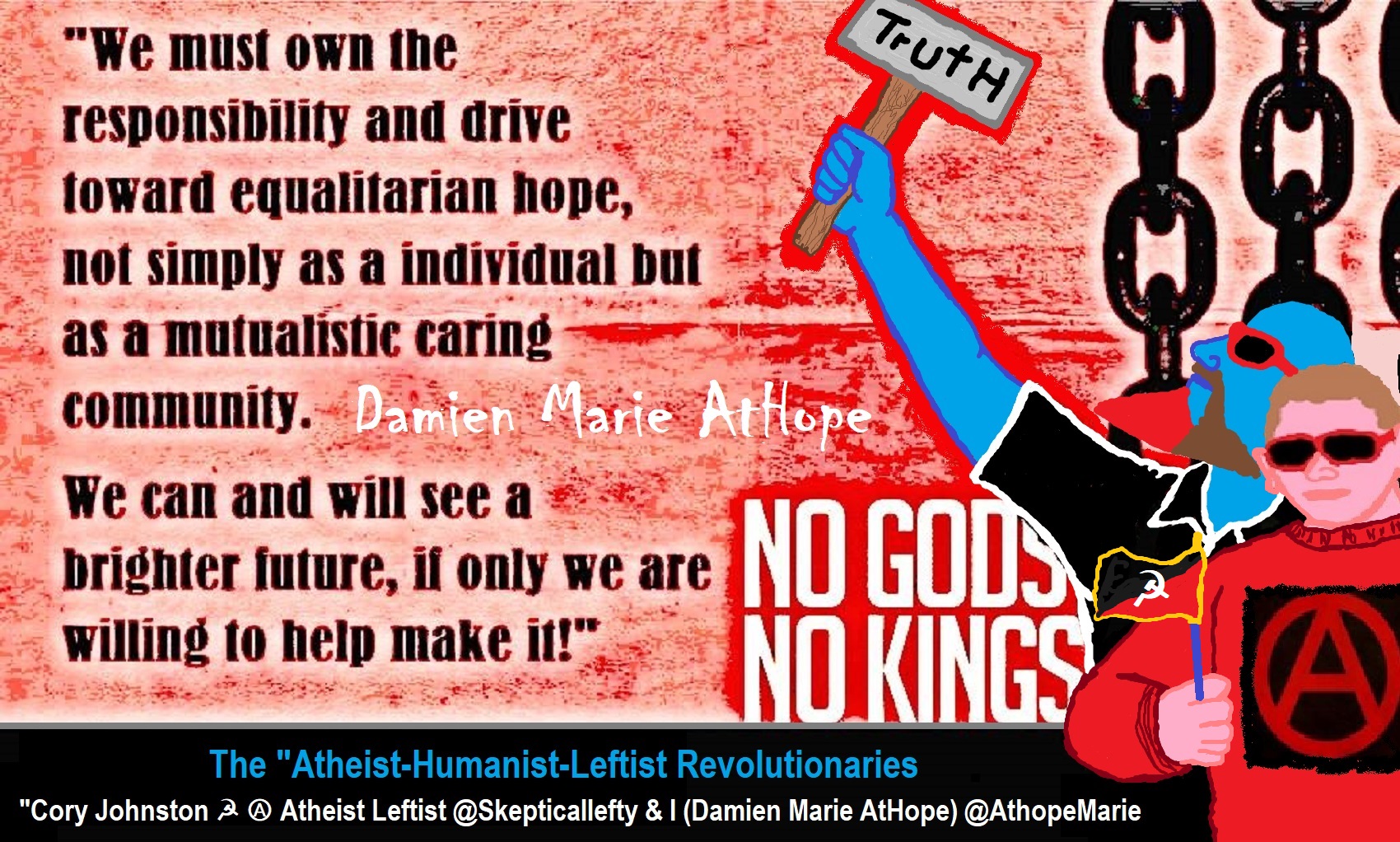
While hallucinogens are associated with shamanism, it is alcohol that is associated with paganism.
The Atheist-Humanist-Leftist Revolutionaries Shows in the prehistory series:
Show two: Pre-animism 300,000 years old and animism 100,000 years old: related to “Anarchism and Socialism”
Show tree: Totemism 50,000 years old: related to “Anarchism and Socialism”
Show four: Shamanism 30,000 years old: related to “Anarchism and Socialism”
Show five: Paganism 12,000 years old: related to “Anarchism and Socialism”
Show six: Emergence of hierarchy, sexism, slavery, and the new male god dominance: Paganism 7,000-5,000 years old: related to “Anarchism and Socialism” (Capitalism) (World War 0) Elite and their slaves!
Prehistory: related to “Anarchism and Socialism” the division of labor, power, rights, and recourses: VIDEO
Pre-animism 300,000 years old and animism 100,000 years old: related to “Anarchism and Socialism”: VIDEO
Totemism 50,000 years old: related to “Anarchism and Socialism”: VIDEO
Shamanism 30,000 years old: related to “Anarchism and Socialism”: VIDEO
Paganism 12,000 years old: related to “Anarchism and Socialism” (Pre-Capitalism): VIDEO
Paganism 7,000-5,000 years old: related to “Anarchism and Socialism” (Capitalism) (World War 0) Elite and their slaves: VIEDO
Paganism 5,000 years old: progressed organized religion and the state: related to “Anarchism and Socialism” (Kings and the Rise of the State): VIEDO
Paganism 4,000 years old: related to “Anarchism and Socialism” (First Moralistic gods, then the Origin time of Monotheism): VIEDO
I do not hate simply because I challenge and expose myths or lies any more than others being thought of as loving simply because of the protection and hiding from challenge their favored myths or lies.
The truth is best championed in the sunlight of challenge.
An archaeologist once said to me “Damien religion and culture are very different”
My response, So are you saying that was always that way, such as would you say Native Americans’ cultures are separate from their religions? And do you think it always was the way you believe?
I had said that religion was a cultural product. That is still how I see it and there are other archaeologists that think close to me as well. Gods too are the myths of cultures that did not understand science or the world around them, seeing magic/supernatural everywhere.
I personally think there is a goddess and not enough evidence to support a male god at Çatalhöyük but if there was both a male and female god and goddess then I know the kind of gods they were like Proto-Indo-European mythology.
This series idea was addressed in, Anarchist Teaching as Free Public Education or Free Education in the Public: VIDEO
Our 12 video series: Organized Oppression: Mesopotamian State Force and the Politics of power (9,000-4,000 years ago), is adapted from: The Complete and Concise History of the Sumerians and Early Bronze Age Mesopotamia (7000-2000 BC): https://www.youtube.com/watch?v=szFjxmY7jQA by “History with Cy“
Show #1: Mesopotamian State Force and the Politics of Power (Samarra, Halaf, Ubaid)
Show #2: Mesopotamian State Force and the Politics of Power
Show #3: Mesopotamian State Force and the Politics of Power (Uruk and the First Cities)
Show #4: Mesopotamian State Force and the Politics of Power (First Kings)
Show #5: Mesopotamian State Force and the Politics of Power (Early Dynastic Period)
Show #6: Mesopotamian State Force and the Politics of Power
Show #7: Mesopotamian State Force and the Politics of Power (Sargon and Akkadian Rule)
Show #9: Mesopotamian State Force and the Politics of Power (Gudea of Lagash and Utu-hegal)
Show #12: Mesopotamian State Force and the Politics of Power (Aftermath and Legacy of Sumer)
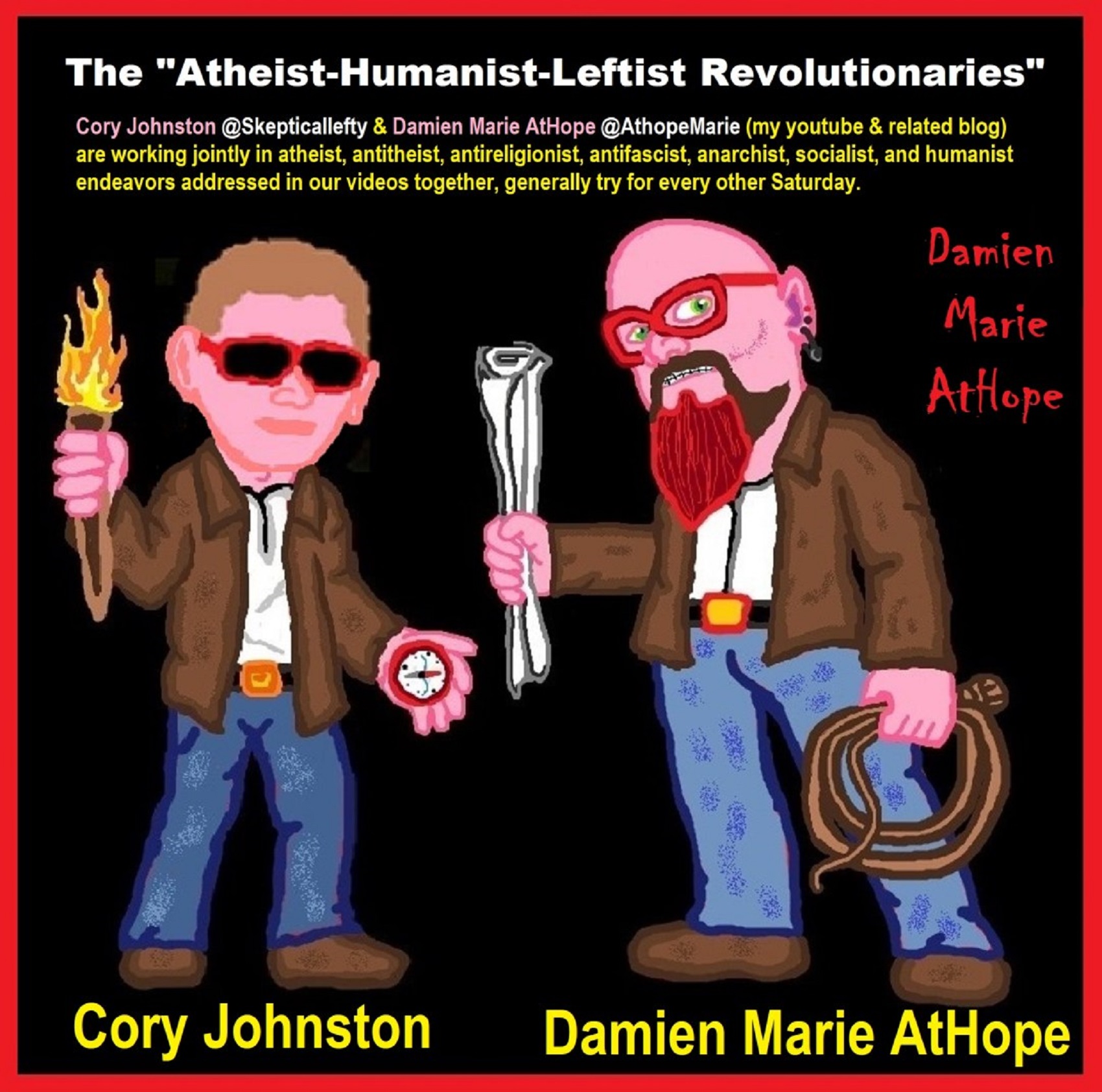
The “Atheist-Humanist-Leftist Revolutionaries”
Cory Johnston ☭ Ⓐ Atheist Leftist @Skepticallefty & I (Damien Marie AtHope) @AthopeMarie (my YouTube & related blog) are working jointly in atheist, antitheist, antireligionist, antifascist, anarchist, socialist, and humanist endeavors in our videos together, generally, every other Saturday.
Why Does Power Bring Responsibility?
Think, how often is it the powerless that start wars, oppress others, or commit genocide? So, I guess the question is to us all, to ask, how can power not carry responsibility in a humanity concept? I know I see the deep ethical responsibility that if there is power their must be a humanistic responsibility of ethical and empathic stewardship of that power. Will I be brave enough to be kind? Will I possess enough courage to be compassionate? Will my valor reach its height of empathy? I as everyone, earns our justified respect by our actions, that are good, ethical, just, protecting, and kind. Do I have enough self-respect to put my love for humanity’s flushing, over being brought down by some of its bad actors? May we all be the ones doing good actions in the world, to help human flourishing.
I create the world I want to live in, striving for flourishing. Which is not a place but a positive potential involvement and promotion; a life of humanist goal precision. To master oneself, also means mastering positive prosocial behaviors needed for human flourishing. I may have lost a god myth as an atheist, but I am happy to tell you, my friend, it is exactly because of that, leaving the mental terrorizer, god belief, that I truly regained my connected ethical as well as kind humanity.
Cory and I will talk about prehistory and theism, addressing the relevance to atheism, anarchism, and socialism.
At the same time as the rise of the male god, 7,000 years ago, there was also the very time there was the rise of violence, war, and clans to kingdoms, then empires, then states. It is all connected back to 7,000 years ago, and it moved across the world.
Cory Johnston: https://damienmarieathope.com/2021/04/cory-johnston-mind-of-a-skeptical-leftist/?v=32aec8db952d
The Mind of a Skeptical Leftist (YouTube)
Cory Johnston: Mind of a Skeptical Leftist @Skepticallefty
The Mind of a Skeptical Leftist By Cory Johnston: “Promoting critical thinking, social justice, and left-wing politics by covering current events and talking to a variety of people. Cory Johnston has been thoughtfully talking to people and attempting to promote critical thinking, social justice, and left-wing politics.” http://anchor.fm/skepticalleft
Cory needs our support. We rise by helping each other.
Cory Johnston ☭ Ⓐ @Skepticallefty Evidence-based atheist leftist (he/him) Producer, host, and co-host of 4 podcasts @skeptarchy @skpoliticspod and @AthopeMarie
Damien Marie AtHope (“At Hope”) Axiological Atheist, Anti-theist, Anti-religionist, Secular Humanist. Rationalist, Writer, Artist, Poet, Philosopher, Advocate, Activist, Psychology, and Armchair Archaeology/Anthropology/Historian.
Damien is interested in: Freedom, Liberty, Justice, Equality, Ethics, Humanism, Science, Atheism, Antiteism, Antireligionism, Ignosticism, Left-Libertarianism, Anarchism, Socialism, Mutualism, Axiology, Metaphysics, LGBTQI, Philosophy, Advocacy, Activism, Mental Health, Psychology, Archaeology, Social Work, Sexual Rights, Marriage Rights, Woman’s Rights, Gender Rights, Child Rights, Secular Rights, Race Equality, Ageism/Disability Equality, Etc. And a far-leftist, “Anarcho-Humanist.”
I am not a good fit in the atheist movement that is mostly pro-capitalist, I am anti-capitalist. Mostly pro-skeptic, I am a rationalist not valuing skepticism. Mostly pro-agnostic, I am anti-agnostic. Mostly limited to anti-Abrahamic religions, I am an anti-religionist.
To me, the “male god” seems to have either emerged or become prominent around 7,000 years ago, whereas the now favored monotheism “male god” is more like 4,000 years ago or so. To me, the “female goddess” seems to have either emerged or become prominent around 11,000-10,000 years ago or so, losing the majority of its once prominence around 2,000 years ago due largely to the now favored monotheism “male god” that grow in prominence after 4,000 years ago or so.
My Thought on the Evolution of Gods?
Animal protector deities from old totems/spirit animal beliefs come first to me, 13,000/12,000 years ago, then women as deities 11,000/10,000 years ago, then male gods around 7,000/8,000 years ago. Moralistic gods around 5,000/4,000 years ago, and monotheistic gods around 4,000/3,000 years ago.
To me, animal gods were likely first related to totemism animals around 13,000 to 12,000 years ago or older. Female as goddesses was next to me, 11,000 to 10,000 years ago or so with the emergence of agriculture. Then male gods come about 8,000 to 7,000 years ago with clan wars. Many monotheism-themed religions started in henotheism, emerging out of polytheism/paganism.

Damien Marie AtHope (Said as “At” “Hope”)/(Autodidact Polymath but not good at math):
Axiological Atheist, Anti-theist, Anti-religionist, Secular Humanist, Rationalist, Writer, Artist, Jeweler, Poet, “autodidact” Philosopher, schooled in Psychology, and “autodidact” Armchair Archaeology/Anthropology/Pre-Historian (Knowledgeable in the range of: 1 million to 5,000/4,000 years ago). I am an anarchist socialist politically. Reasons for or Types of Atheism
My Website, My Blog, & Short-writing or Quotes, My YouTube, Twitter: @AthopeMarie, and My Email: damien.marie.athope@gmail.com

